The 47th Pia Film Festival (6-20 September 2025) / PFF Award 2025
The 47th Pia Film Festival 2025
Dates:6~20 September 2025
Venue: National Film Archive of Japan
■Films PFF AWARD Competition in 2025
text by K. F. Watanabe
Anokoro (あの頃) 11min.
Directed by Toda Tota
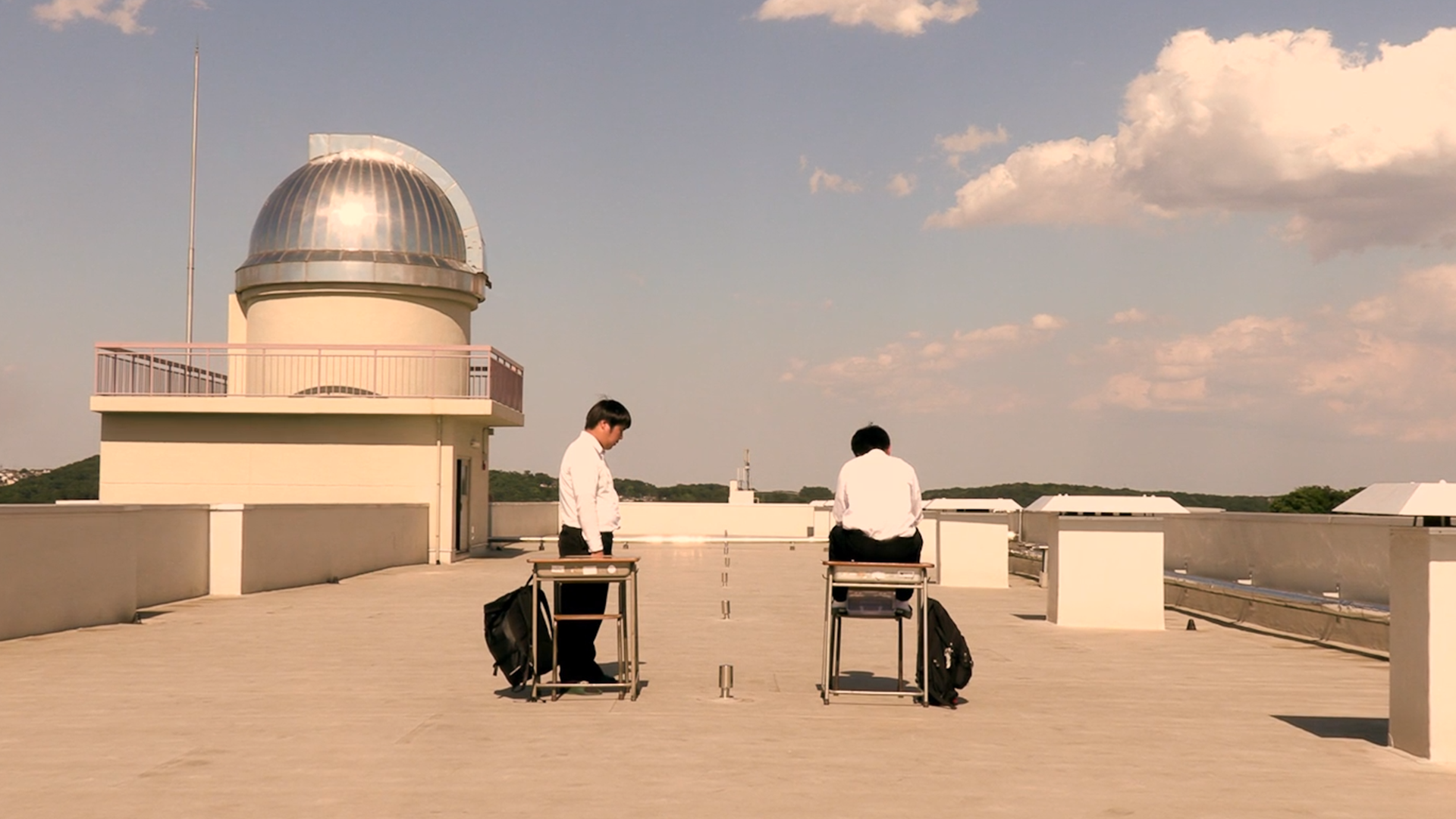
When a high school student struggles to recognize his own life’s dream, a new friend reassures him with a symbolic dorodango, mud ball.
After a chance encounter, Muraoka, a shy high school student, meets Oishi, a quirky yet self-assured classmate, and the pair quickly become friends. Largely keeping to himself, Oishi carries around a treasure from his childhood days in a plastic case: a dorodango—a ball made by patiently applying sand on compacted mud over time—something Muraoka also enjoyed making as a child. One day, Muraoka struggles after a career survey prompts him to write his life’s dream and he confides to Oishi that he is unsure what it is. As Oishi reflects on Muraoka’s situation, his dorodango becomes a powerful symbol of holding onto and cherishing one’s dreams in the face of a reality that often forces people to abandon them. “Everyone has dreams,” Oishi reassures Muraoka, “we’ve just forgotten them.”
■Born in 2007 and interested in filmmaking since elementary school, director TODA Tota aimed to make a film that would reassure high school students close to his own age who may face uncertainty about their future. Like a dorodango, his film is a labor of love that attests to the joy of creating something to share with others.
Under My Skin 20min.
Directed by Hosokawa Yoshiharu
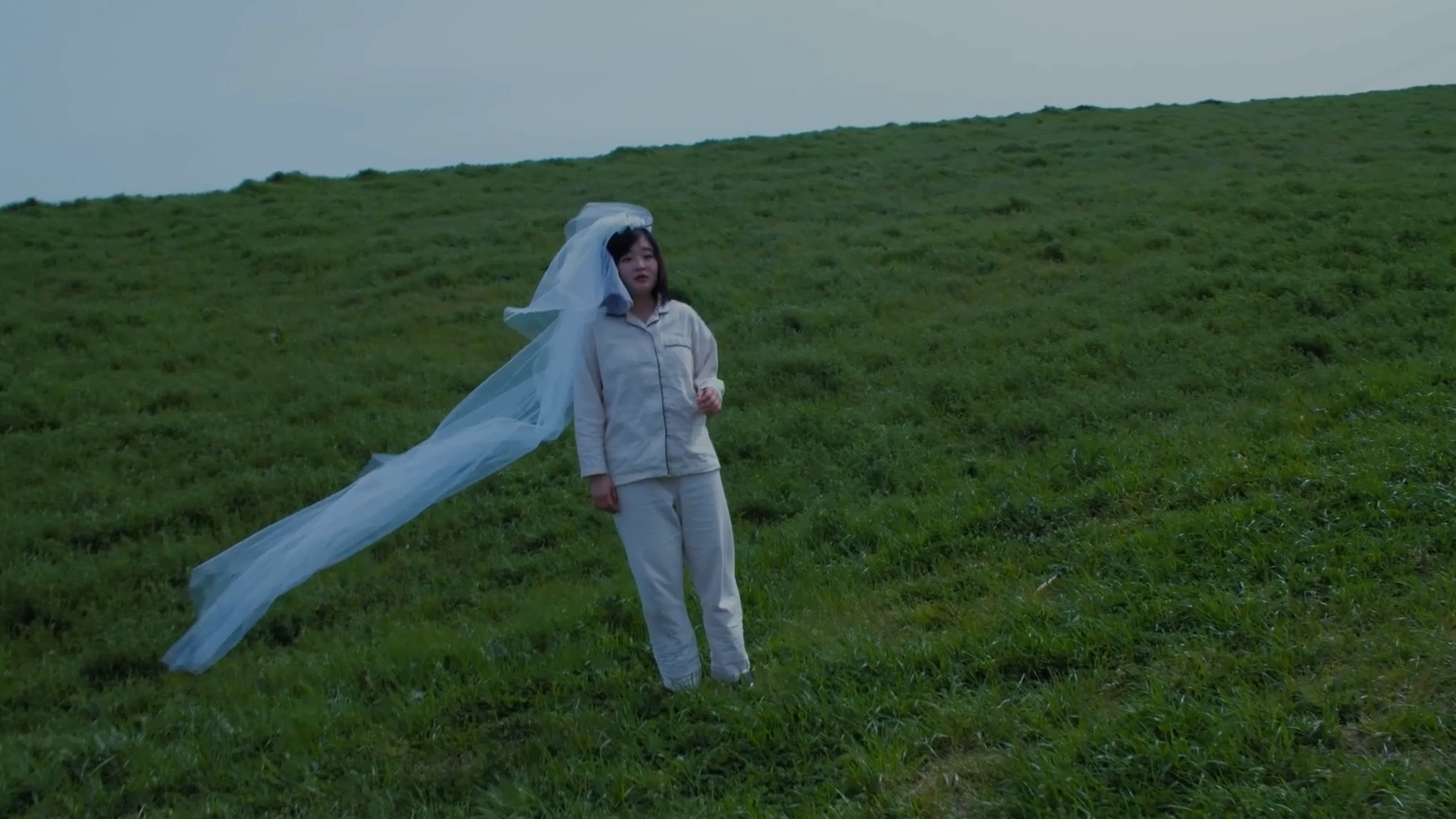
Hopelessly in love with her uninterested high school classmate, a seventeen-year-old girl navigates the messy, isolating reality of her desire.
A troubled seventeen-year-old girl living alone with her father has an all-consuming infatuation with a high school classmate who does not reciprocate her feelings. Following him around after school, her obsession leads her to seek out any form of connection, tangible or otherwise: a can of coffee touched by his lips, the lingering warmth on the bench where he sat, his discarded clothes. Undeterred by the boy’s indifference and even his violent rejection of her when they’re together, the solitary life she leads when they’re apart—isolated from her classmates and her father—reveals the frightening depths of her overwhelming distress, emotional instability, and torturous longing. In a society where sexual desire is treated as a transactional commodity, is there any place for her vision of love?
■Directed by HOSOKAWA Yoshiharu, this impressive debut narrative short about adolescent love and its raw, intense, emotional messiness was written from an original idea by lead actor SUZUKI Miyuki, who delivers an exceptionally commanding performance as a young woman on the verge of a nervous breakdown.
Kakuremino (カクレミノ) 35min.
Directed by Sawada Haru
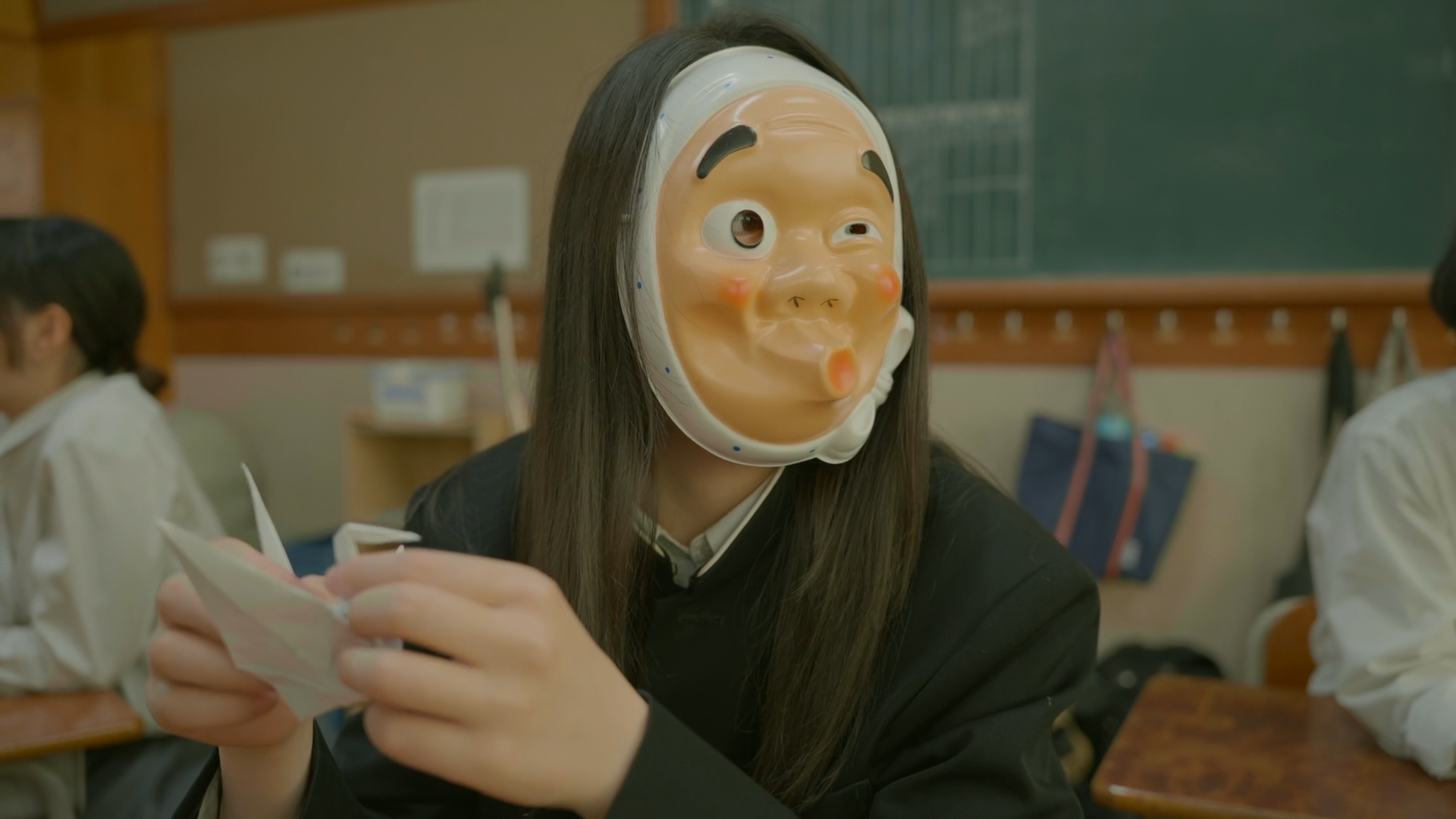
Bullied at school, a transfer student forms an unexpected friendship with a mute girl in a hyottoko mask, prompting him to reconsider how to deal with his isolation.
Soon after transferring to a new high school, a bookish sixteen-year-old student named Tsukasa becomes the victim of relentless bullying by his classmates, pushing him to the edge of despair. One day, a strange, mute girl wearing the school’s uniform and a hyottoko mask (a comical depiction of an old man with a puckered mouth commonly worn during Japanese festivals) appears before him, communicating by notepad and pen. Believing her to be a hallucination or an imaginary friend conjured by his loneliness, Tsukasa refuses her repeated invitations to talk and walk home together. Before long, however, he realizes that the masked girl is indeed real—a student named Fumi who was also bullied but is now completely ignored by her classmates after a traumatic event. Finding solace in their status as social outcasts, the pair become increasingly close, leading Fumi to suggest Tsukasa become a living ghost like her.
■Finding inspiration in the concept of using “counterpoint” in filmmaking, director SAWADA Haru makes repeated use of contrapuntal music as ironic commentary on the sad—and sometimes very dark—situations and themes in her film. The choral song「怪獣のバラード」(“Kaiju Ballad”) leaves an especially strong impression.
Naomi Out of Sync (空回りする直美) 44min.
Directed by Nakazato Fuku
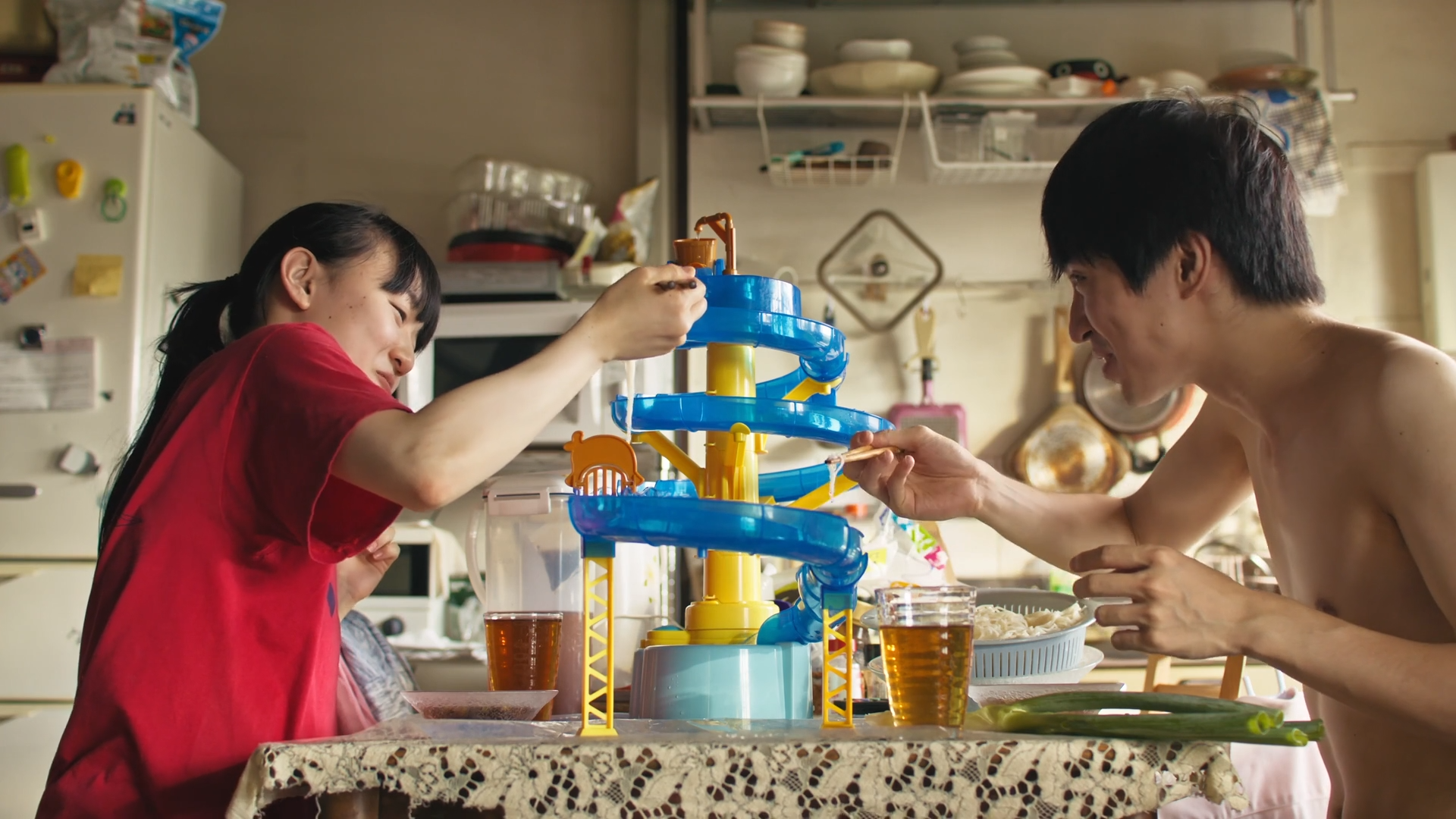
An eighteen-year-old girl looks after her developmentally disabled brother with love and humor. When she accidentally hurts his feelings, however, their world is turned upside down.
Living in a cramped Tokyo danchi apartment with her largely absent father and her older brother Shingo, who has a developmental disability and physical tics, eighteen-year-old Naomi has a lot on her plate. Not only must she mediate conflicts between her father and brother at home while holding down a part-time supermarket job alongside an adversarial co-worker, but she also takes on the role of Shingo’s caretaker—reminding him to eat, bathe, and take his medication—when their father leaves them alone for days on end. Despite her naturally humorous and playful disposition, Naomi’s protectiveness toward her brother makes her lash out at a rude stranger during a park outing, unintentionally hurting Shingo’s feelings. The resulting rift between siblings plunges Naomi’s world into turmoil when she later comes home to find that Shingo has gone missing.
■This endearing comedic drama, directed by NAKAZATO Fuku, excels at capturing the special bond between close siblings whose love for each other helps them overcome life’s hardships. Although the brother and sister characters inhabit a very small space, their intimate relationship and unique personalities make their shared world feel larger than the universe.
Yellow Stain (黄色いシミ)32min.
Directed by Nomura Kazuaki
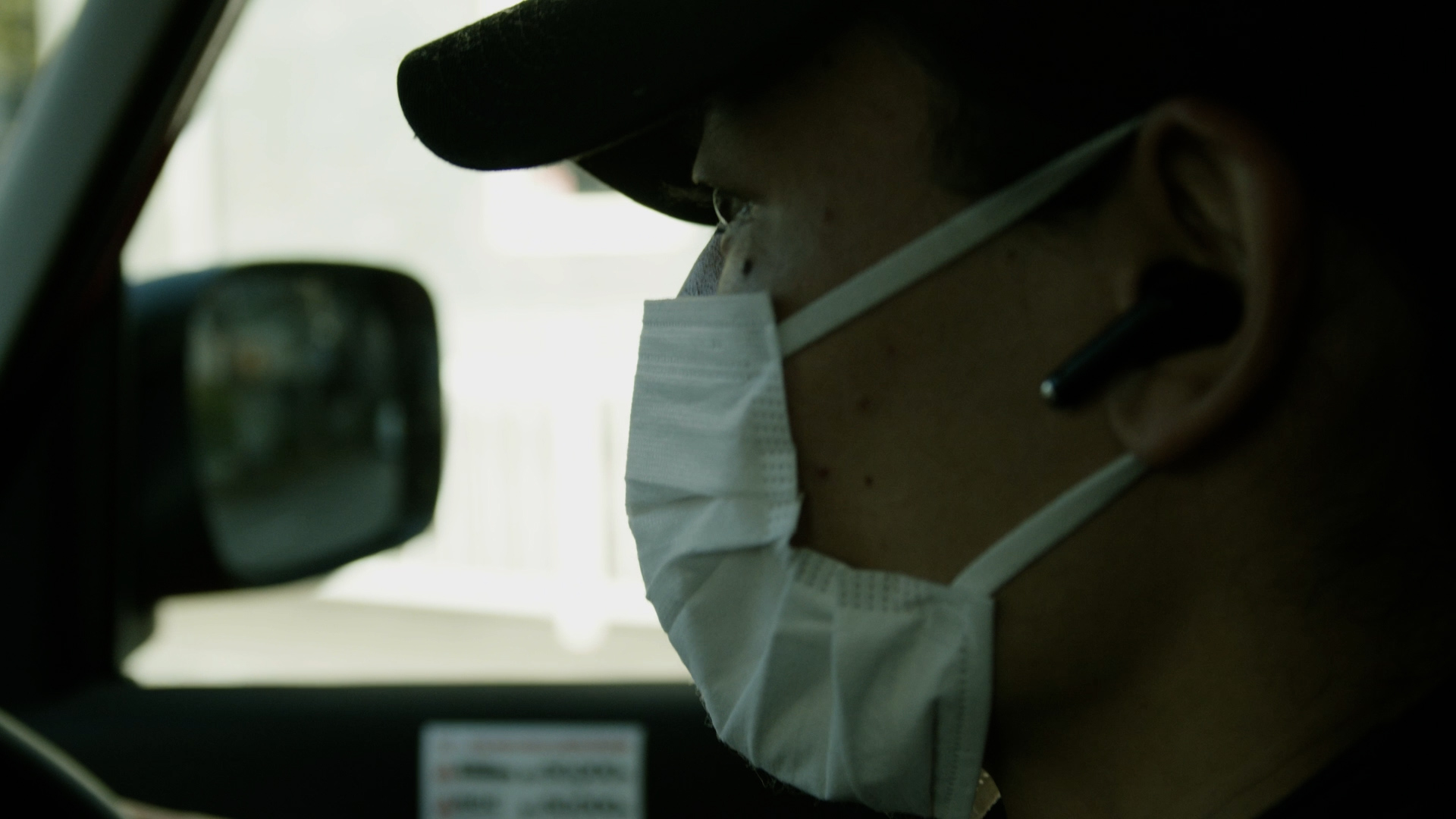
A driver picks up three young men to commit an unspecified crime. When one of the men becomes unresponsive, the situation quickly turns life-or-death.
In this tense, minimalist thriller, a young driver is tasked with picking up three other young men to carry out an unspecified crime in broad daylight. Following precise instructions through an earpiece from an anonymous handler surveilling his every move, he carries out his duties with stoic composure under mounting pressure. But when the job is nearly complete, the final drop-off takes an unexpected turn: the last remaining passenger suddenly becomes unresponsive—frozen in fear or regret—jeopardizing the mission. Reporting back, the driver receives a final, chilling command that leaves him face to face with a yellow stain. Loosely inspired by true events, Yellow Stain examines the dilemma of young men forced into crime with their lives on the line.
■Directed by NOMURA Kazuaki—who appeared as an actor in the 2022 PFF Grand Prix-winning film "J005311" directed by his collaborator KONO Hiroshi, who also makes an appearance in this film—this meticulously planned short is shot largely in close-up in a single take, making full use of real-time silence to amplify the unnerving tension of the story to maximum effect.
Wounded Angels (傷ついた天使) 96min.
Directed by Tanabe Kosei
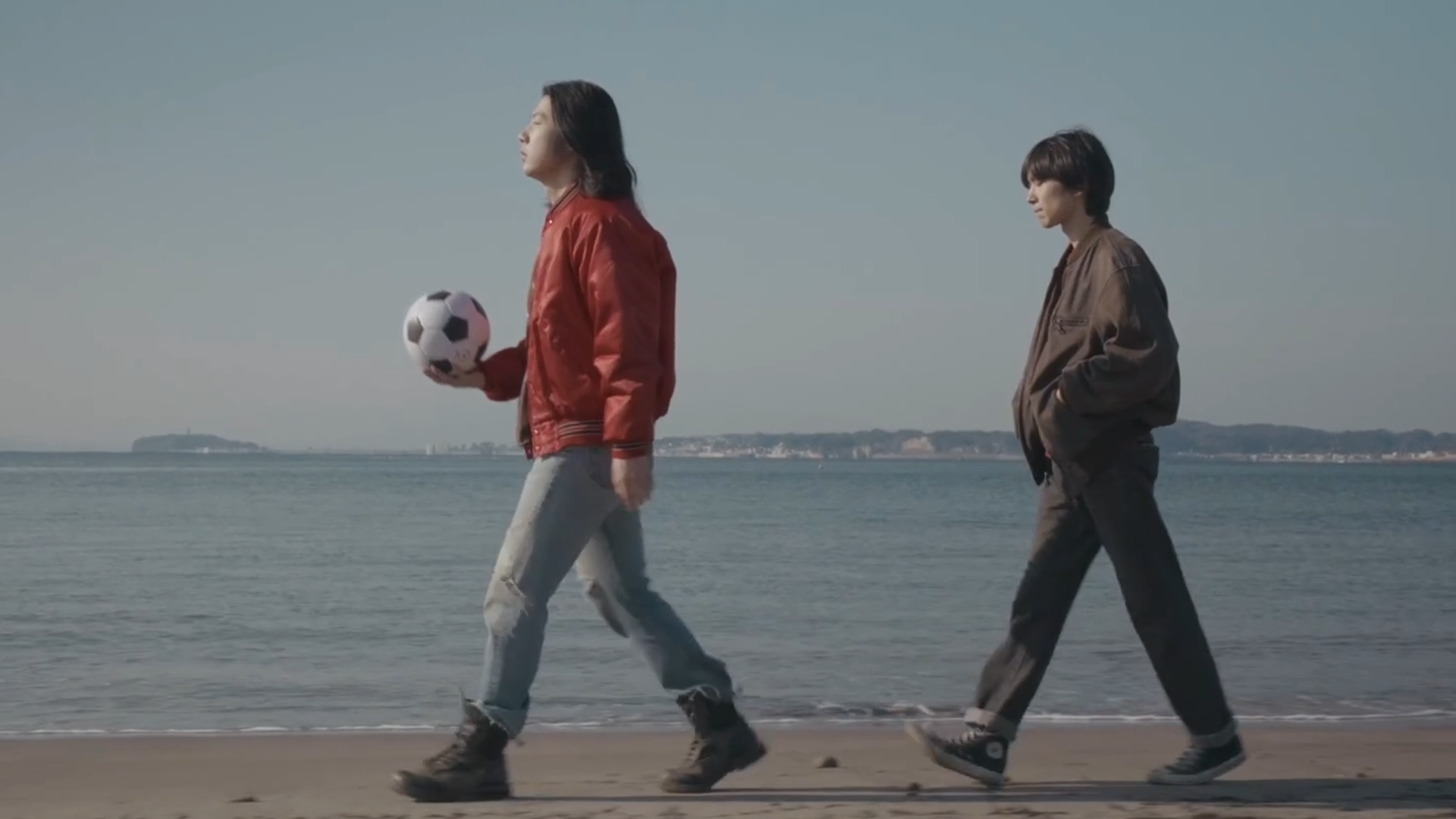
Leaving behind everything, a young man journeys from his home in Tokyo to the open road without looking back. But what is he truly searching for?
One day, a listless twenty-something movie rental store employee named Jun decides to leave his Tokyo apartment and hit the road on foot, intending to never return. Almost immediately, his possessions are stolen, but he continues on with only the clothes on his back and the little cash left in his pocket, unbothered. Jun’s journey takes him through the city, where he meets a young salaryman interested in music and film but too busy to enjoy his hobbies, and into the woods, led by a disinterested young man living with his perpetually drunk brother, until he eventually ends up in a small seaside town with views of Mount Fuji. There, he is taken in by a group of similarly aimless but carefree peers who spend their days driving around, smoking, and playing on the beach. Each encounter subtly transforms the quietly observant Jun, yet the conclusion of his soul-searching odyssey—and the reasons behind it—remains just out of view.
■Director TANABE Kosei (selected for the 2024 PFF Award for his first feature film "Goodbye Icarus") returns to the festival with an introspective road film that captures the existential malaise of youth searching for meaning. With a mixture of empathy, humor, and curiosity, he sets his character upon a quest for utopia within a free-flowing narrative that offers more questions than answers.
Caravan 59min.
Directed by Shoji Ko
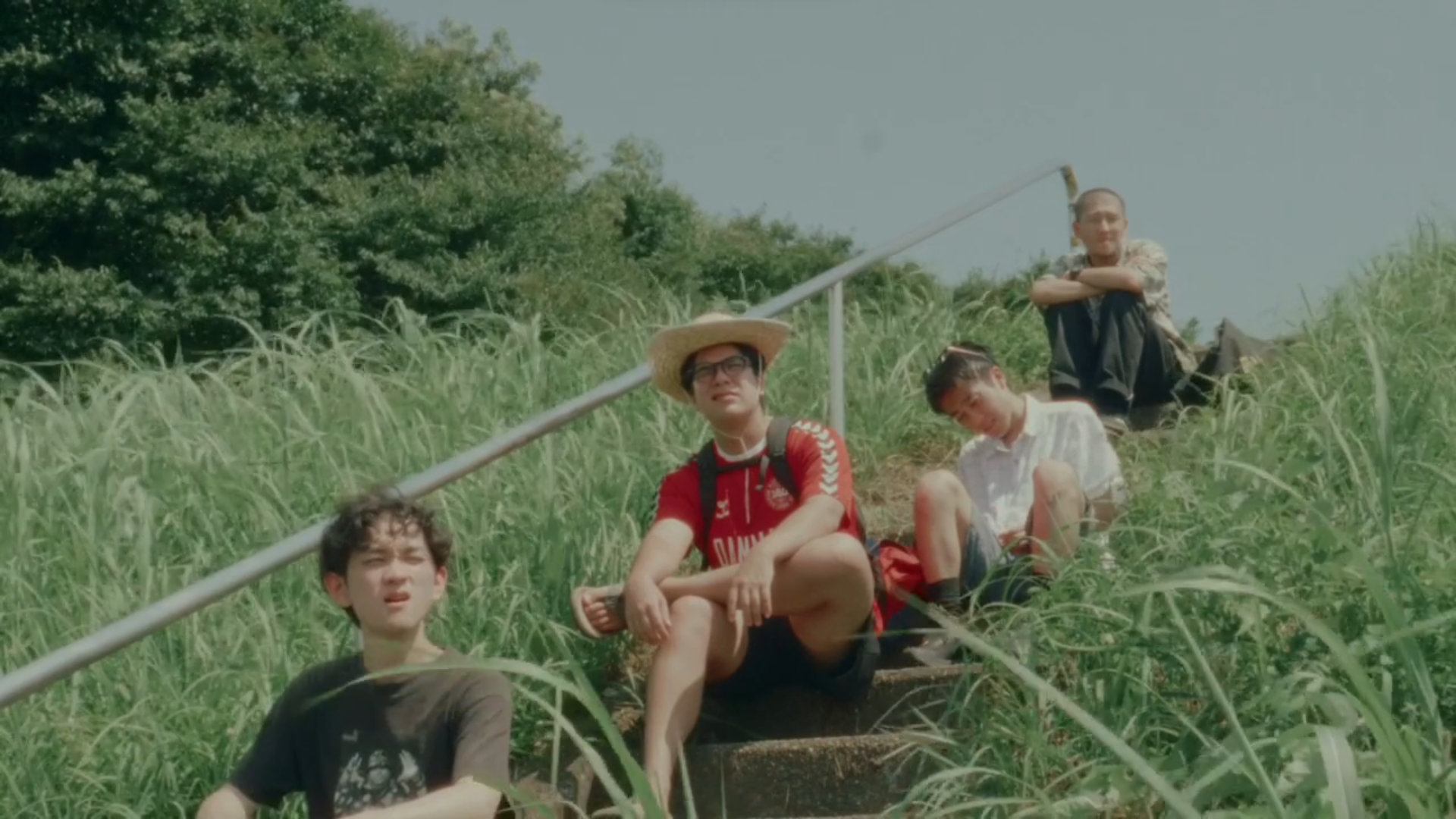
Four college friends spend one final summer together before adulthood pulls them apart, hoping to create lasting memories—even as one quietly struggles to retain his own.
In their final summer together after graduating from university, four close friends take one last trip before they each embark on their own post-collegiate path. Renting a small cabin in the remote countryside, they pass the days idly taking in nature, sitting by the fire, reminiscing, and shooting the breeze. Every now and then, someone mentions their plans after the summer—one of the friends will return to Denmark, another will become a salaryman. The only one undecided is Wakamatsu, who appears somewhat withdrawn throughout their vacation. Left alone with one of the friends, he confides that he has trouble remembering things due to a childhood head injury—memories of events and people he’s met seem to fade gradually until he can’t recall them at all. Will he remember this trip, meant to preserve their final moments together? Will he even remember his friends?
■Taking inspiration from Jonas Mekas’s 1968 experimental diary film Walden, director SHOJI Ko’s laid-back drama considers the nature of memory and how it shapes our experience of life. With this simple yet profound premise, he creates a bittersweet summer travelogue—replete with non-narrative interludes and languorous shots of trivial conversation—that urges viewers to reflect on the memories that constitute a life lived.
Kussetsu no Yukue (屈折の行方) 66min.
Directed by Kamobayashi Tomonari
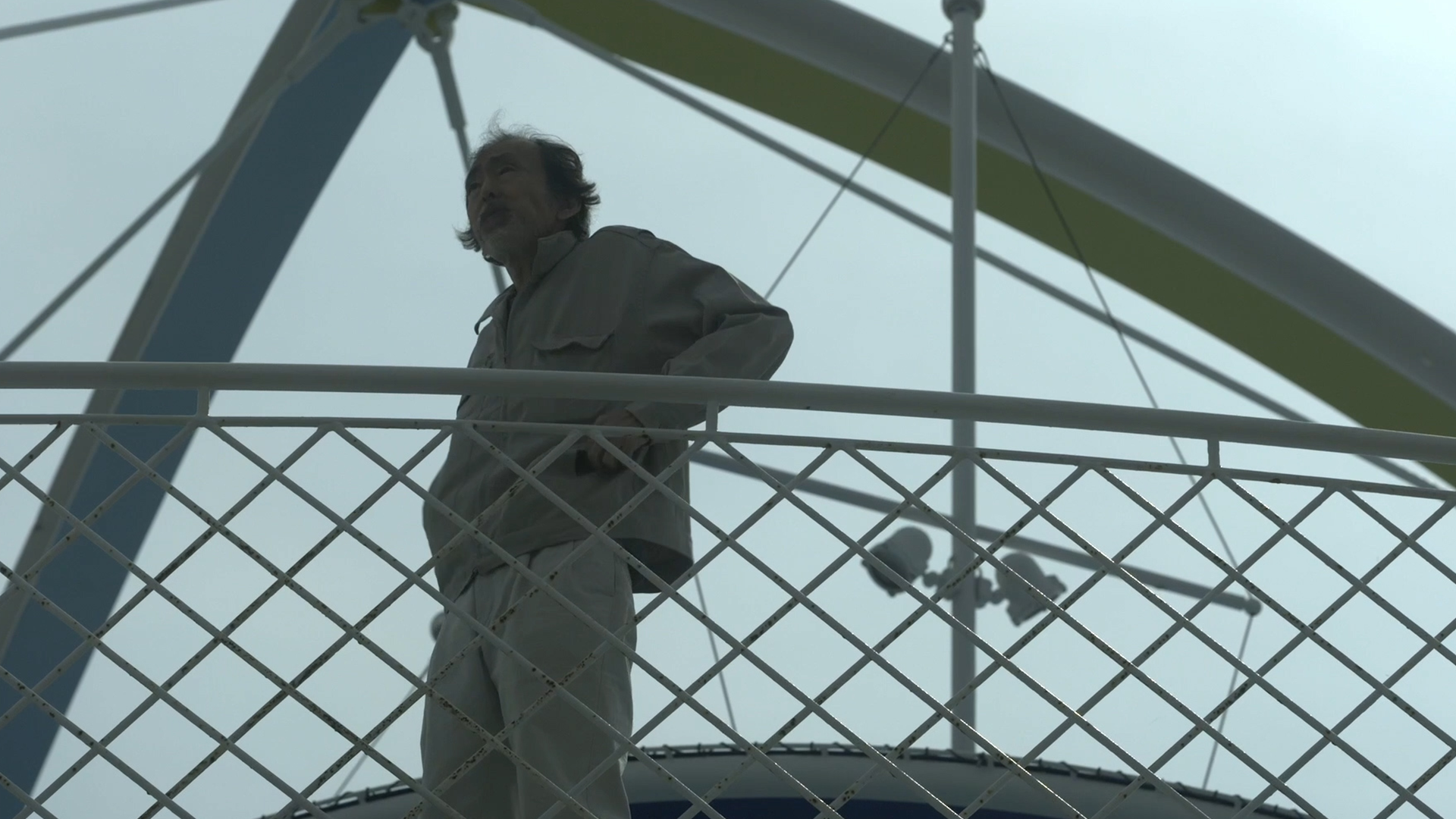
A film student turns his camera on his former teacher—once the target of his bullying—unearthing the long-buried guilt and resentment between them.
Struggling with the script for his thesis film about classroom bullying, university student Kenichi decides to instead make a documentary about Kaneko-sensei—his former elementary school teacher who resigned after being bullied by his students, Kenichi foremost among them. Now living alone as an unmarried day laborer in his parents’ home, Kaneko agrees to Kenichi’s proposal but chooses to fabricate aspects of his solitary life to seem less pitiful: he claims to make a living as a photographer and enlists his ex-wife to pretend they are still married and living together. As Kenichi begins filming Kaneko at home, a cat-and-mouse game develops between the filmmaker and his subject, gradually exposing the true feelings hidden within both perpetrator and victim—a volatile mix of guilt, resentment, and self-preservation simmering beneath the formalities of their daily interactions. As the project unfolds, Kenichi’s camera becomes a mirror, reflecting
■This precise and subtly profound drama about atonement by KAMOBAYASHI Tomonari explores the gap between truth and reality in filmmaking—and in life—by using the framework of documentary to underscore the complex interplay of agency and intention between filmmaker and subject. With careful pacing and layered dialogue, KAMOBAYASHI’s film invites us to carefully consider both sides of the camera lens.
Kurenai no Sora (紅の空) 26min.
Directed by Segawa Sho
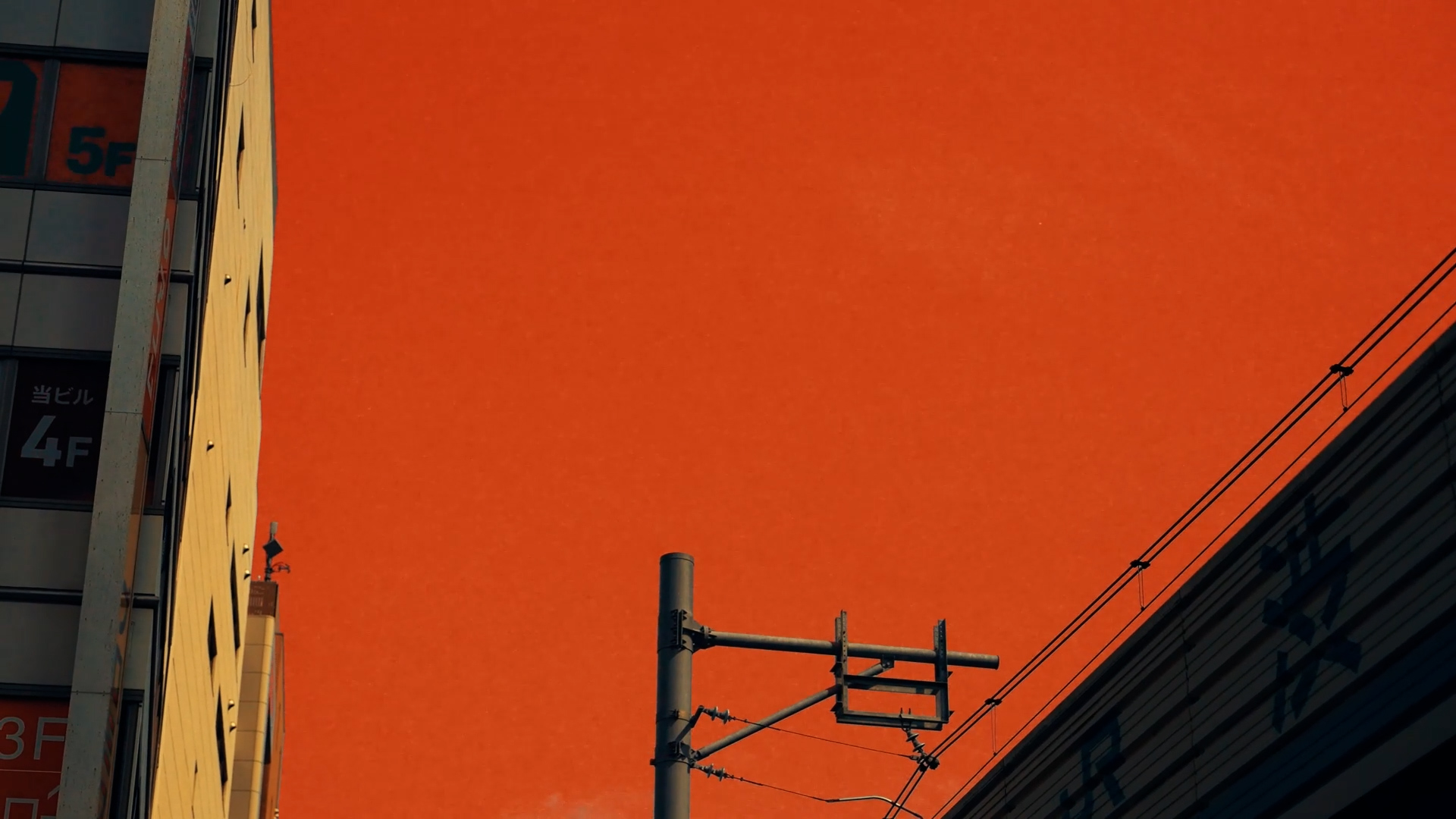
In a dystopian alternate reality, Japan’s skies burn red from environmental pollution, clouding a high school boy’s vision of the future.
In this speculative science fiction short set in an alternate reality, Japan has become one of the world’s great chemical industrial superpowers since 1938 due to its invention and production of synthetic petroleum. Nearly a century of environmental pollution has turned Japan’s skies a crimson red, and extremist groups have responded with terrorist attacks on the chemical plants responsible. Against this dystopian backdrop, a melancholic high school student named Ito transfers from Sapporo to Tokyo where he meets Nono, a classmate who also ditches classes to hide away in the school library. When Ito receives news that his father may be among the men missing in the latest chemical plant bombing, the direction of his life becomes even more uncertain—he doesn’t belong in Tokyo, but he also doesn’t want to return to Sapporo, and his childhood dream of becoming a pilot seems impossible. Meanwhile, Nono plans her own escape.
■In this thought-provoking short, director SEGAWA Sho captures the despondency and aimlessness of young people thrust into a violent, destabilized world beyond their control and comprehension. Set in a fictional Japan that mirrors its present-day reality, the film’s pervasive red sky provides a striking visual warning of what may come—or what is already here.
CROSS-TALK 26min.
Directed by Harada Joe
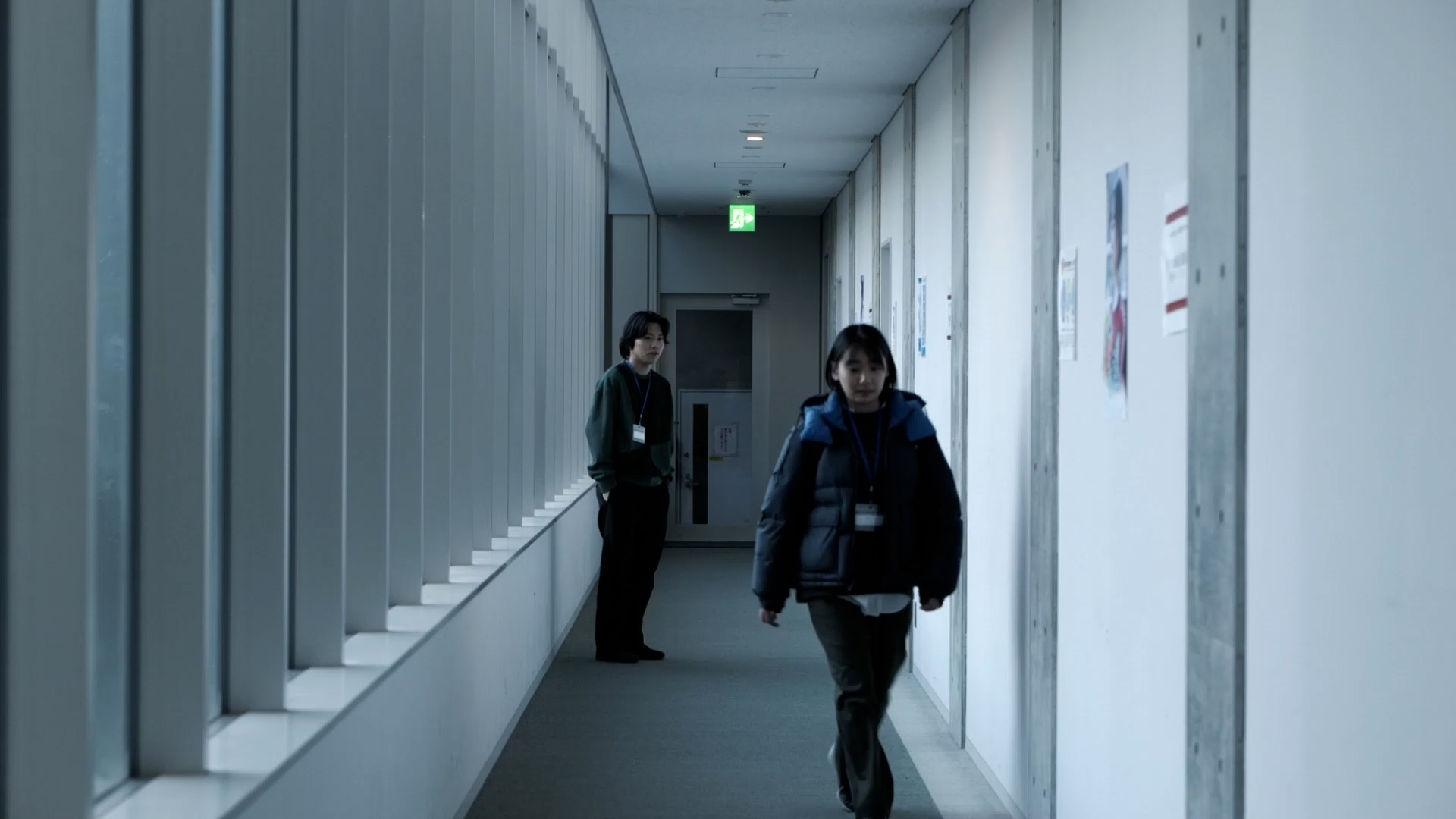
A call center employee, desensitized by the endless complaints of others, learns the importance of human connection after responding poorly to a colleague’s cry for help.
Tokita works part-time at a TV station in Shibuya where he fields phone calls from viewers who mostly lodge complaints. Numbed by the repetitive nature of his job, he issues canned apologies without fully addressing the callers’ concerns. His antisocial behavior extends beyond the office: instead of joining his chatty co-workers for after-work drinks, Tokita would rather retreat to his apartment and watch silent movies alone. One night, Funai, a junior colleague who has taken an interest in him, calls Tokita in a moment of panic after being grabbed by a stranger on the way home. But Tokita, unable to recognize her distress and need for reassurance, gives Funai an inappropriately dismissive response and she hangs up on him. The next day, she doesn’t respond to his text messages and avoids him at work, prompting Tokita to regret his words and reflect on his inability to connect with those around him.
■Setting his film in the bustle of Shibuya, director HARADA Joe succinctly examines the ironic isolation of modern Tokyo life through the simple yet effective premise of a man who spends his days talking to strangers yet fails to communicate with the people closest to him—even those who most need his support.
Vicissitude(郷) 93min.
Directed by Ijichi Takuro
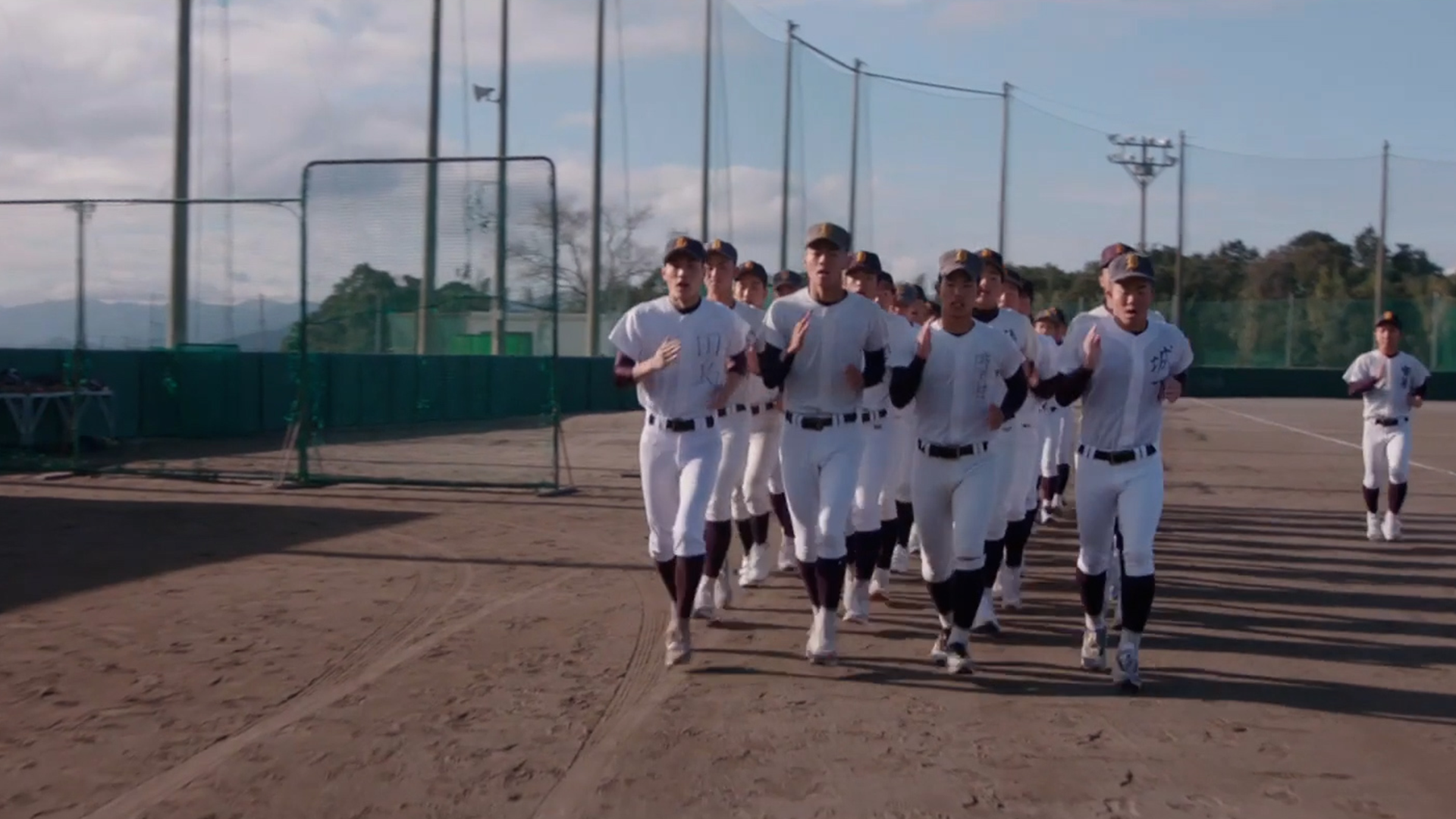
When personal tragedy strikes, a high school baseball player reflects on his childhood in Kagoshima as he ponders the meaning of his life.
Soft-spoken high school freshman Gaku has a single-minded ambition to become a professional baseball player. Ignoring the guidance of his teachers and abandoning his social life—including the gentle romantic advances of his classmate Saki—he obsessively commits himself to his stern head coach’s rigorous, military-like training regimen while enduring insults and bullying from upperclassmen on the team. As Gaku’s perseverance and hard work begin to pay off, however, a life-changing event forces him to reconsider his future and reflect on his past. Meeting with his school’s guidance counselor, Gaku recalls his childhood days spent playing in the mountains, forests, and surrounding sea of his hometown in Kagoshima with his best friend Ryu, triggering a shift in the film toward poetic abstraction as Gaku’s past, present, and future collide to reveal his innermost thoughts.
■In this highly accomplished debut feature, director IJICHI Takuro—born and raised in Kagoshima—takes bold artistic swings to convey the scope of his philosophical vision, filling his unconventional youth drama with stunning shots of his seaside hometown as an expression of his protagonist’s spiritual yearning. A gorgeously shot, narratively experimental meditation on youth and the loss of innocence.
Jinsei wa Itsudatte Hard da(人生はいつだってHARDだ) 34min.
Directed by Kasahara Takashi

Living together in a rundown Tokyo apartment, two men aimlessly trudge through their lackluster routines until a hiking trip ruptures their co-dependent complacency.
Thirty-year-old unemployed slacker Takashi lives in a cramped Tokyo apartment with forty-year-old Akio, who sells amaguri (broiled sweet chestnuts) from a tiny stall at Shibuya Scramble Crossing. With considerable patience and kindness, Akio watches over the immature and brash Takashi, sharing every aspect of domestic life—eating, sleeping, showering, and even urinating together—without much conflict. Depressed from a recent breakup, Takashi spends most of his day sleeping and masturbating. Meanwhile, Akio drifts through his monotonous work routine with little thought, appearing neither happy nor sad. However, when the pair take a spontaneous hiking trip, Akio takes an unexpected action that startles Takashi. Afterwards, a subtle shift emerges between the two friends, signaling the possible end of their relationship—or, for Takashi, perhaps a new beginning.
■Rooted in frustrations with his own life, director KASAHARA Takashi created this DIY film with HATTORI Akio as a two-man crew, sharing acting, writing, directing, cinematography, editing, lighting, art direction, and sound roles. A raw, honest self-portrait that channels the stagnation, fatigue, and harsh realities of everyday life.
Yet To be Named (名前をつけるのは、これから) 39min.
Directed by Ebayashi Mizuki
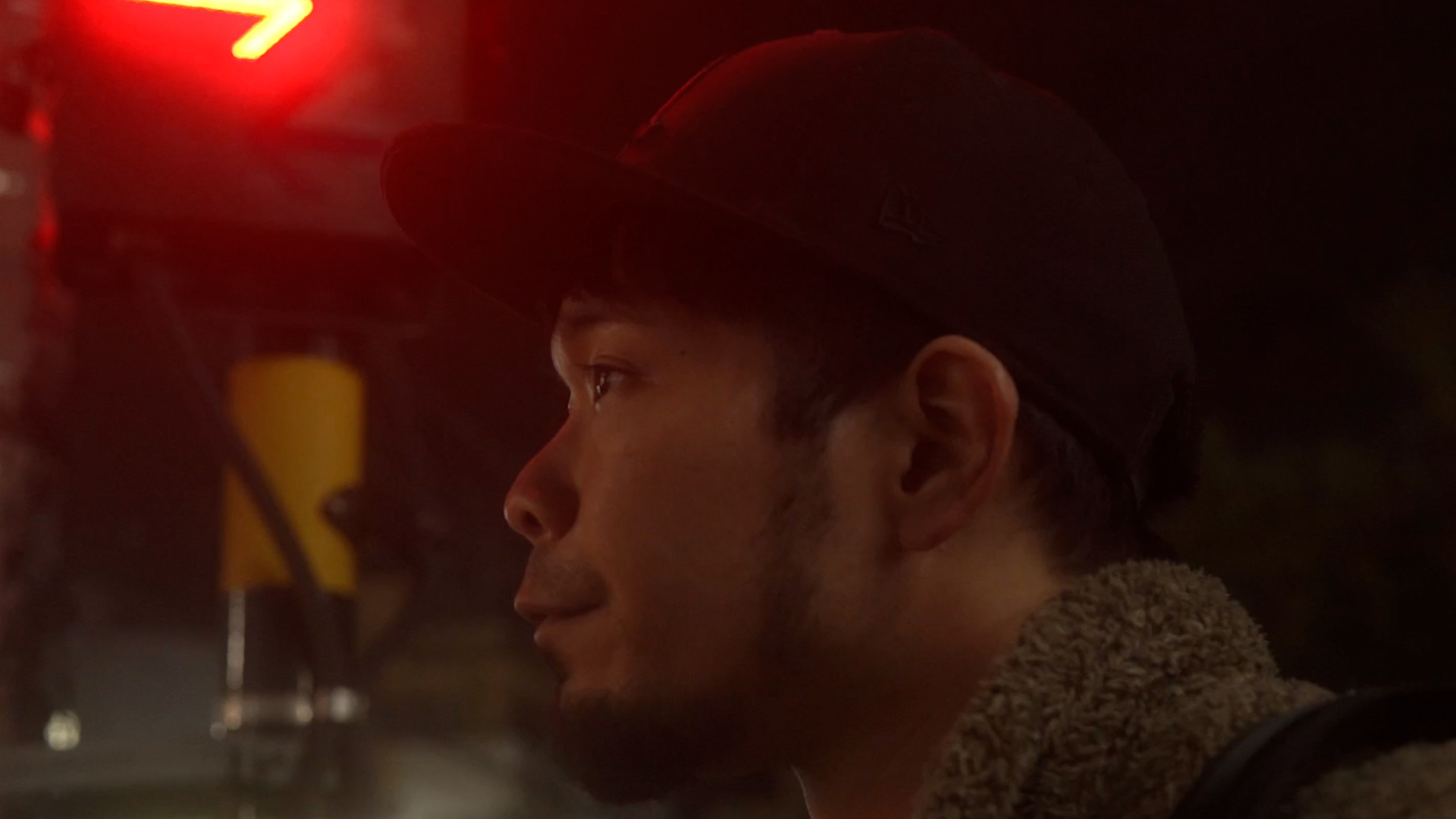
Confronted with a major life change, a young filmmaker turns to his unfinished script in order to process his insecurities and past trauma.
Twenty-eight-year-old filmmaker Yukihiko moonlights as a food delivery worker in Tokyo while living with his partner Kaede, who is pregnant with their unnamed first child. Introspective and restless, he spends his day working on the untitled draft of his screenplay, an autobiographical story about a twenty-eight-year-old food delivery worker named Yukihiko who meets his father almost twenty years after being abandoned by him. As Yukihiko pores over his writing and repeatedly recites the dialogue between his father and son characters, the layers of his own life trauma are gradually pulled back to reveal his lingering pain from being left behind and his insecurity about becoming a father. Searching for answers to the questions that still haunt him, Yukihiko repeatedly asks himself aloud, “Why?”
■In this reflexive medium-length drama, director EBAYASHI Mizuki takes a boldly minimalist approach—primarily setting the film in a single room as day turns to night—and emphasizes repetition to trance-like effect, provocatively capturing the artist’s struggle to understand himself through his own work.
Noise no Junin (ノイズの住人) 48min.
Directed by Andrés Madrueño
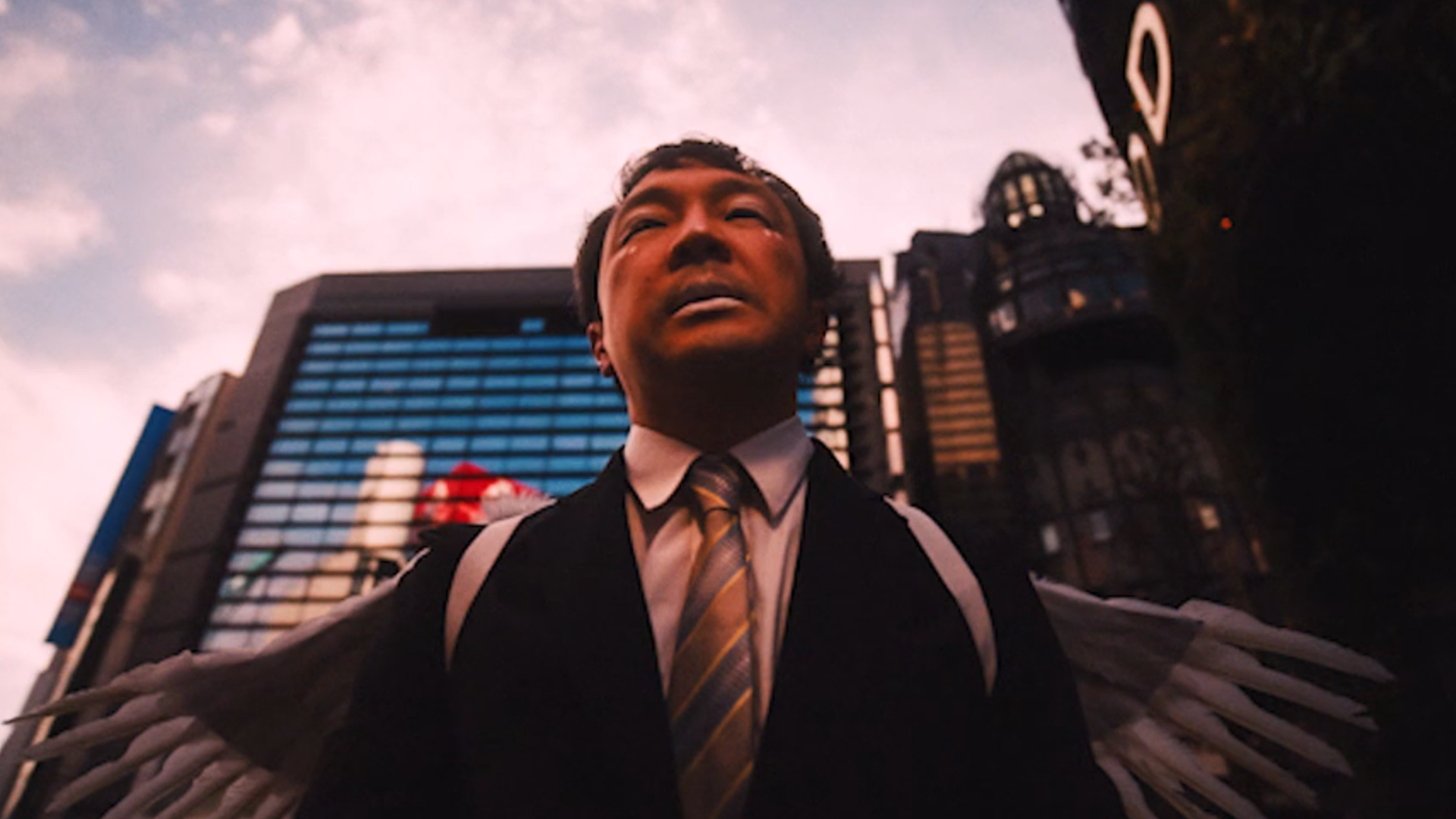
Three young filmmakers chase their dreams while sharing a single-room apartment, facing constant setbacks and the harsh realities of no-budget filmmaking.
Togo, Asuka, and Toru are three young aspiring filmmakers dedicated to chasing their artistic ambitions despite limited resources. While Togo and Asuka quit their part-time jobs, the more practical Toru is accepted into graduate school and plans to find work after graduation. The trio move into a single-room apartment together on the outskirts of Tokyo, where they plan to live while making their next film. Yet despite their determination to resist the conventional life forced upon them by society—defined by meaningless work, overtime, bosses, and power harassment—they cannot escape the need to constantly discuss expenses and pool together whatever yen remains in their pockets to keep their dreams alive. ¥60,000 for rent, ¥62,000 for their next film, ¥200,000 for a screening space… As the friends earnestly press forward, constant setbacks and disappointments force them to wonder how long they can sustain this way of life.
■Motivated to inspire fellow aspiring filmmakers, Mexican-born director Andrés MADRUENO embraces the constraints of a low budget as an opportunity for experimentation and discovery, creating an idiosyncratic work that both celebrates and empathizes with the realities of a creative life. Like his characters, MADRUENO rejects convention and ventures boldly into uncharted territory in pursuit of individual expression despite all.
PEAK END 120min.
Directed by Shin Chaerin
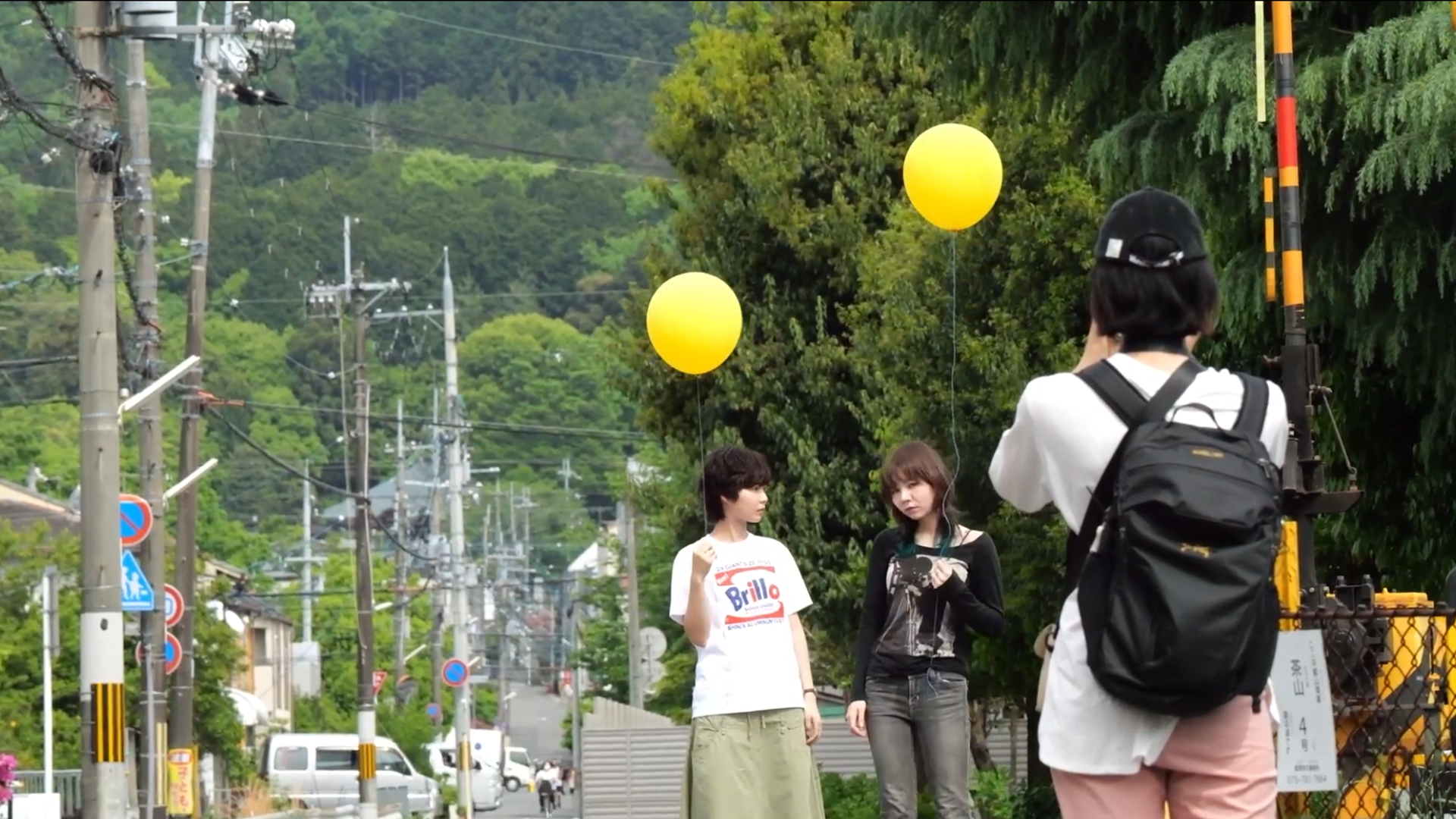
Two young artists in Kyoto turn their cameras on each other to create a dual portrait that meditates on art, friendship, and self-discovery.
Rin and Sora are young artists and university film students living together in Kyoto as outsiders—Rin from Seoul and Sora from Okinawa. Despite their divergent backgrounds, and the fact that they’ve only known each other a short time, the women quickly become two halves of the same whole. They begin filming their relationship, taking turns recording each other as they share their thoughts and document their artistic collaborations—sending jam sandwiches to the sky with yellow balloons, hanging diaristic photographs in a makeshift tunnel exhibition. From there, the pair travel to Okinawa, transforming the film into a home video-like travelogue that explores the people and places that shaped Sora’s identity. As they shift fluidly between observer and observed, Rin and Sora examine how their identities both diverge and intersect, blurring the line between subjectivity and objectivity and deepening a bond that transcends what can be captured on film.
This freewheeling hybrid documentary, directed by SHIN Chaerin (“Rin”), celebrates her personal relationship with Sora, who appears in the film as its primary subject alongside the filmmaker. Like Rin and Sora, the film is constantly in motion, searching for itself—improvising as it moves through uncertainty, guided by the friendship at its center that gives it meaning.
BRAND NEW LOVE 84min.
Directed by Iwakura Ryuichi
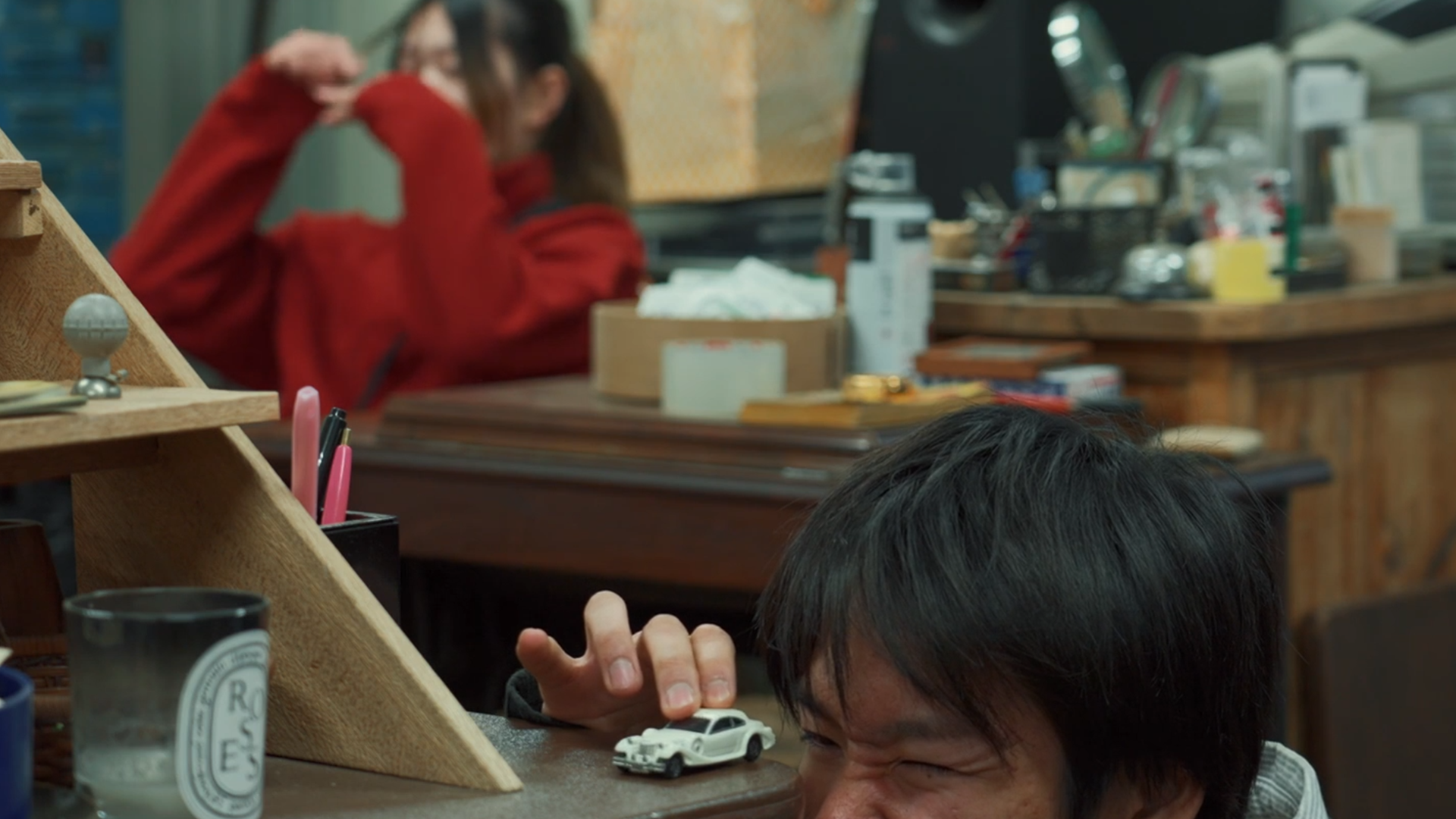
A young couple on the verge of breaking up take a short trip to watch over a relative’s antique shop, putting their love to the test.
Yuiko and Kenichi are a young couple hitting a rut in their relationship. When Yuiko’s divorced uncle must leave town for a few days to attend a wedding, she agrees to watch over his small antiques shop in western Tokyo—derailing Kenichi’s plan to go on a proper birthday trip together and widening the distance between them. Staying in the old apartment above the shop, the pair sleep in separate rooms, exchanging only the bare minimum through a sliding door. But when Kenichi takes an interest in a set of teacups on display, Yuiko secretly sets out to secure them as a birthday gift—only to discover that the cups have already been sold to its previous owner, who reveals their symbolic meaning. As Yuiko and Kenichi each spend time alone, they privately long to repair their fractured relationship—but can their old love find a new beginning?
■Taking inspiration from Roberto Rossellini’s 1954 film A Trip To Italy, director IWAKURA Ryuichi’s artfully crafted debut feature offers a nuanced, realistic portrait of a relationship on the verge of collapse. Through quiet gestures and nuanced behaviors that reveal his characters’ inner lives, IWAKURA demonstrates the power of subtlety and restraint in conveying profound emotions.
Boku wa Gataro (僕はガタロウ) 18min.
Directed by Kubochi Hono
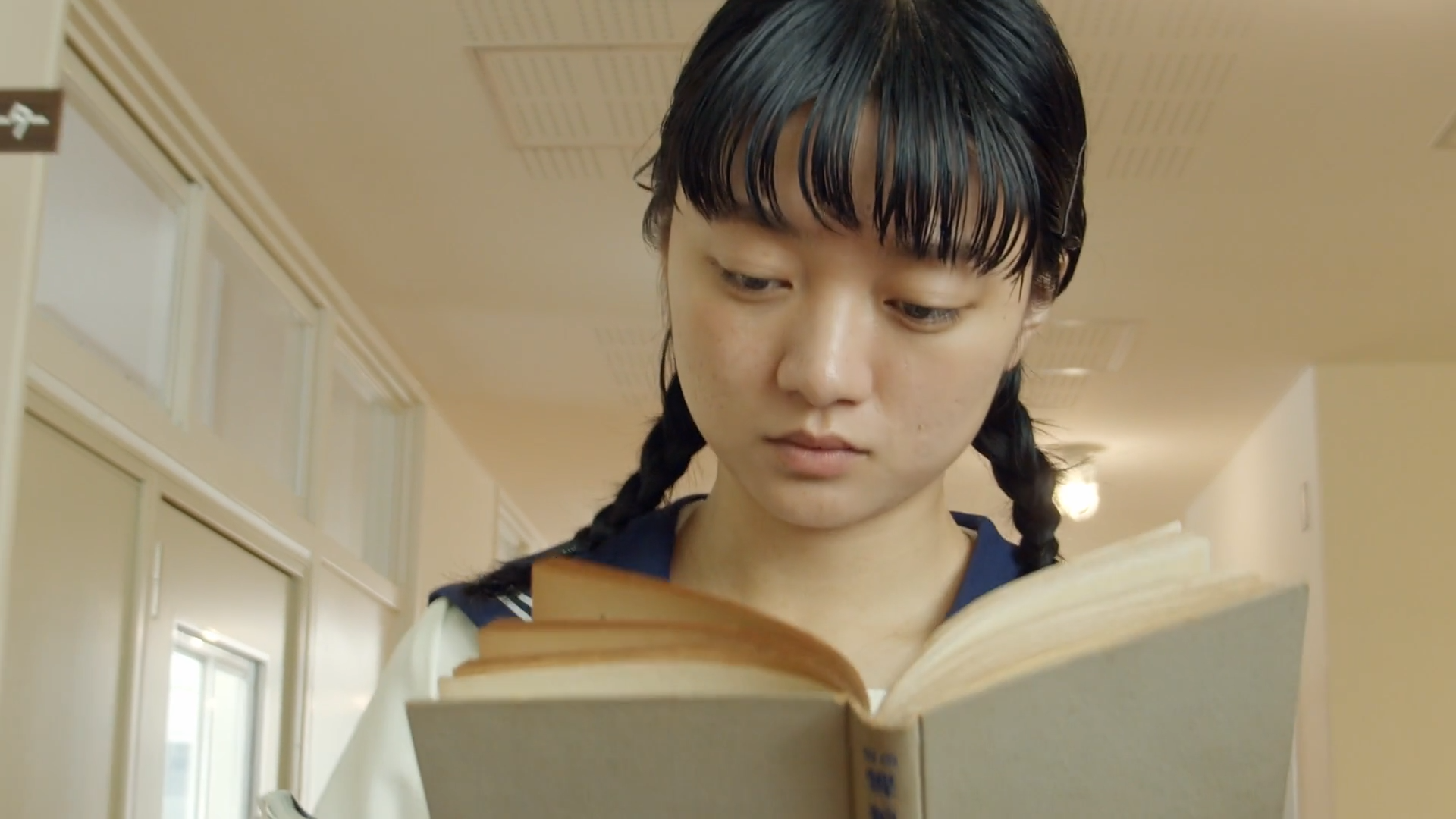
A bookish high schooler hides his fear of insects to befriend a bug-obsessed transfer student, leading to a series of comical and heartfelt misunderstandings.
Book lover Kotaro collides with transfer student Yukiko in their high school hallway while they are both absorbed in their books. Thinking he’s found a fellow bookworm, Kotaro later approaches Yukiko—only to discover, to his mild horror, that her true passion isn’t books, but insects… which terrify him. Mishearing his name as Okuwa Gatarou (a play on the word okuwagata, a Japanese giant stag beetle), Yukiko meanwhile believes she's found a fellow insect enthusiast. Keeping his phobia and real name a secret, Kotaro continues spending time with Yukiko, becoming increasingly drawn to her unabashed eccentricity and unbridled enthusiasm. When he finally reveals the truth during a rare beetle-hunting excursion, however, Yukiko feels betrayed, and their relationship is abruptly fractured. Desperate to win her back, Kotaro turns to his friends—and to Yukiko’s drawing of a large tiger longhorn beetle—for help.
■In this charming coming-of-age romance, full of warmth and clever wordplay, director KUBOCHI Hono celebrates the value of appreciating people for who they truly are—even if their passions are a little squirm-inducing. Adding a touch of humorous realism, KUBOCHI cast her film school colleague, who has a real-life aversion to insects, in the role of Kotaro.
My Small World 11min.
Directed by Maruoka Yuzuki
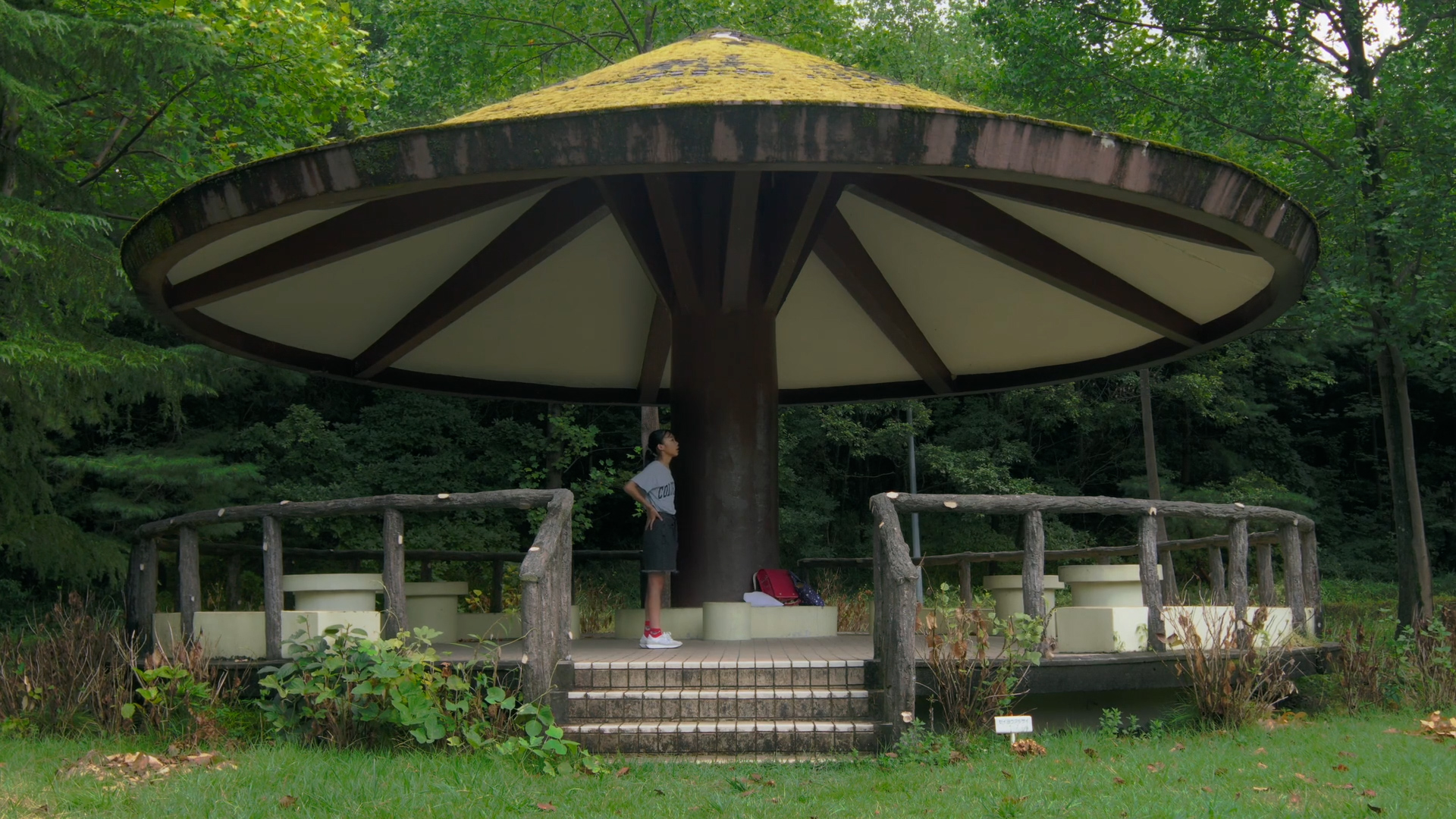
A shy elementary school girl who refuses to attend school joins a music class, where she discovers her voice—and a new friend.
Natsuki, a shy and solitary fifth-year elementary school student, skips school every day. Instead, she attends after-school music classes where she enjoys singing as part of a choir, led by a kind instructor who helps her find her voice. Her elementary school classmate, Ayaka, who also participates in the music classes, at first notices Natsuki and coldly remarks, “You don’t come to school, but you come here, huh?” As the days pass, however, Ayaka continues to be intrigued by Natsuki, who single-mindedly practices her singing and dancing alone in the park, seemingly content in her own little world. As Natsuki’s confidence grows, a subtle shift occurs between the girls’ interpersonal dynamic. One day, Ayaka follows Natsuki to the park to be near her, opening a path to reconciliation and friendship.
■This heartwarming short was inspired by director MARUOKA Yuzuki’s childhood memories of participating in a musical troupe, whose members also make an appearance in the film. Its simple yet moving premise uses song to deliver an emotional punch and remind audiences of the tender preciousness of youth.
Miyazawa-san wa Hagasenai(宮沢さんは剥がさせないっ!) 12min.
Directed by Kanazawa Makoto
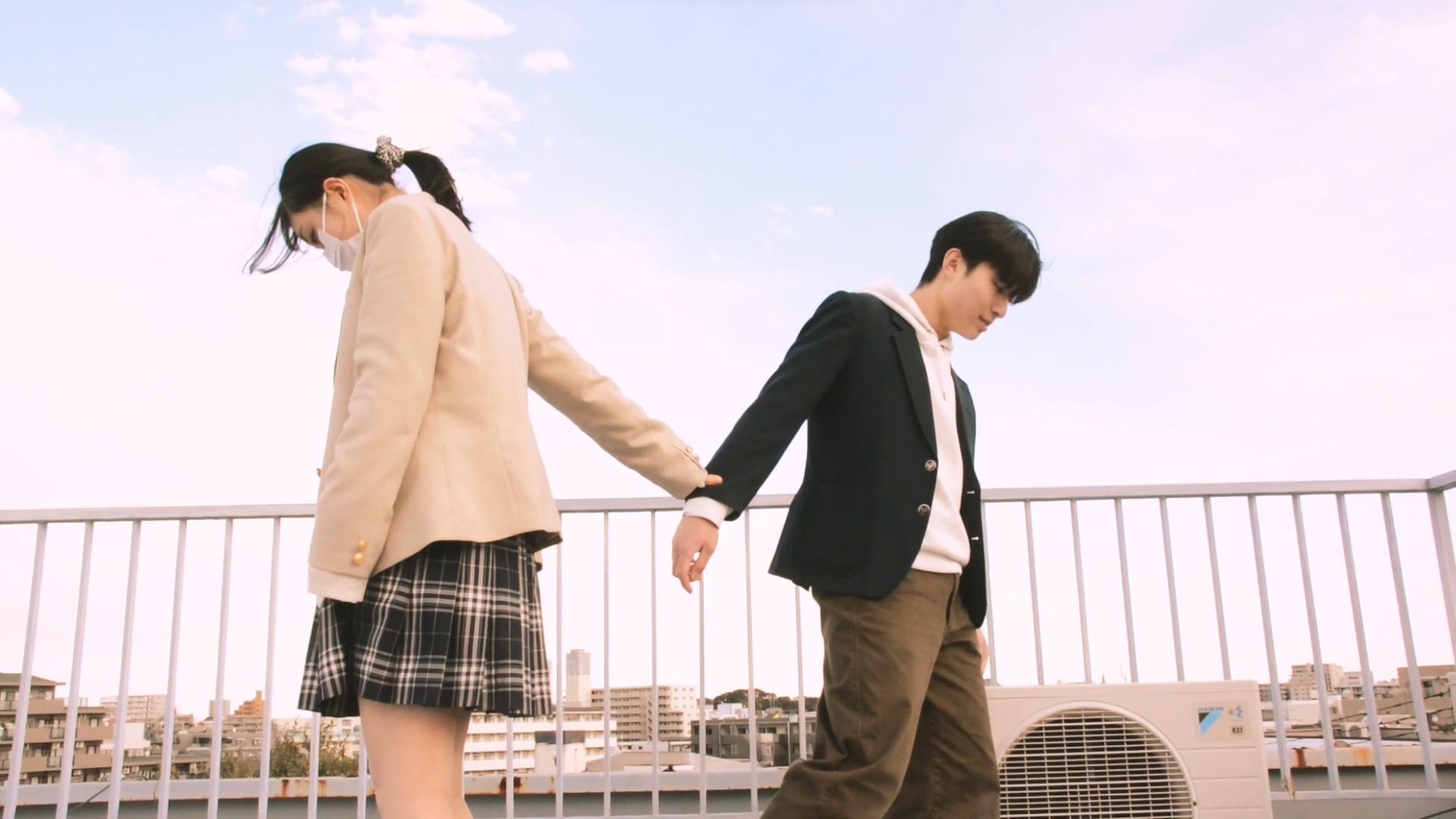
With help from his friends, a high school boy hatches a plan to remove the mask from his longtime crush in order to finally reveal her smile.
High school student Shin falls madly in love with his classmate Miyazawa Sana at first sight. Two years pass before he finally gathers the courage to offer her a letter that expresses his feelings. Yet even after another two months, their relationship fails to progress, and Shin’s fixation reaches a breaking point. With his friends Ryutaro and Sadahiko, Shin hatches a three-pronged plan to remove what he sees as the final barrier between him and Sana: the mask she always wears. First, strongman Ryutaro will try to snatch the mask away by brute force. Second, tech nerd Sadahiko will attempt to subdue her with a remote controlled device and the school’s hacked security cameras. And, if all else fails, Shin must confront Sana himself. Evading capture by Ryutaro and Sadahiko, Sana is left alone with Shin, where her mask is finally removed—revealing her secret…
■Utilizing a comically hyperreal live-action anime style mixed with animated sequences, director KANAZAWA Makoto’s inventive short takes a lighthearted take on the timeless theme of teen love, buoyed by an energetic soundtrack. Beneath its playful surface, however, lies an earnest message of love and acceptance.
Ro-16 Gotou (ロ-16号棟) 11min.
Directed by Inoue Yui
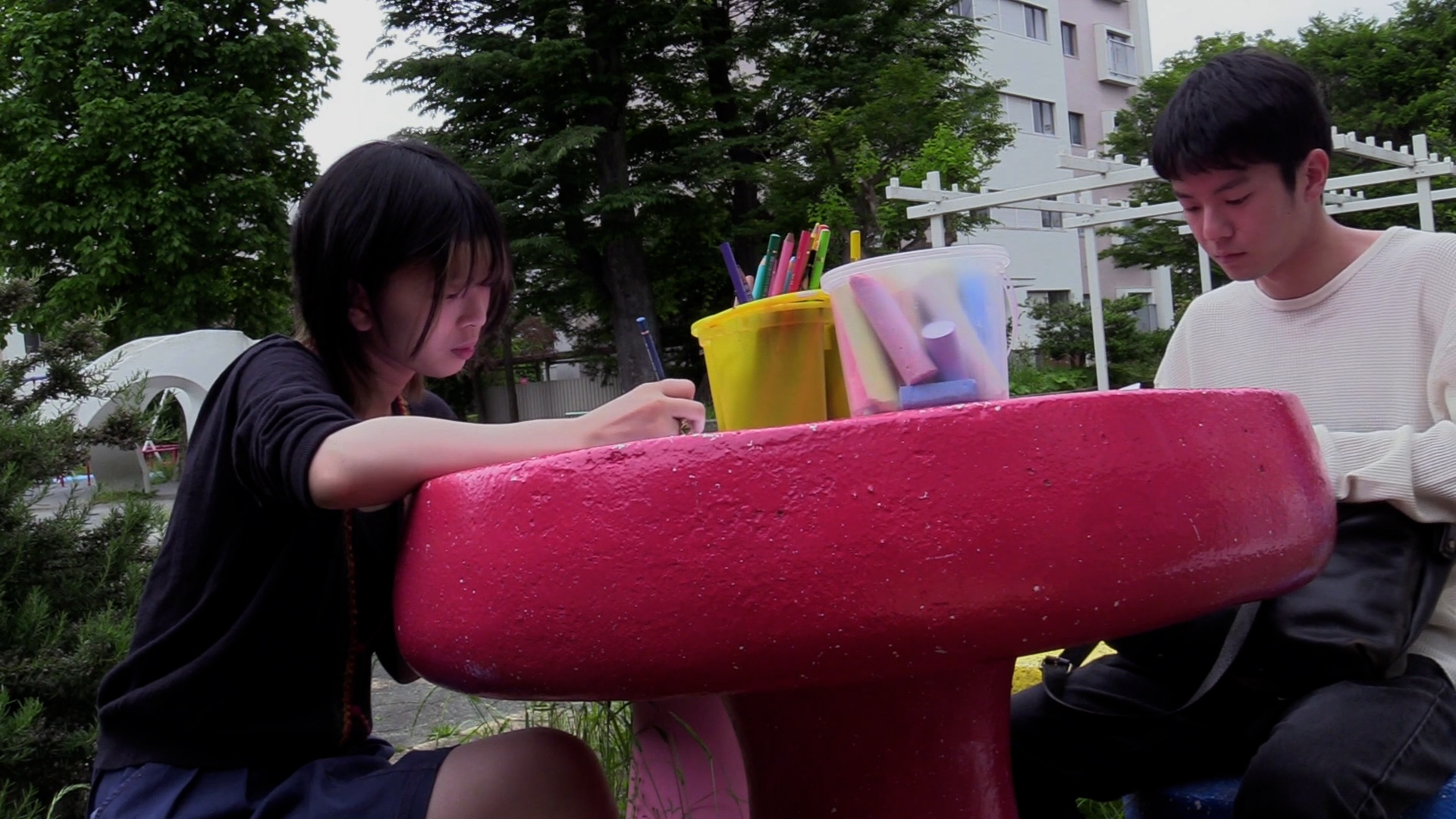
A boy and girl reconnect over their shared childhood around a danchi apartment complex while the sights and sounds of demolition surround them.
While drawing outside of a danchi apartment building undergoing demolition, Rui reunites with Ueki, a boy who once attended the same kindergarten as her. Though they haven’t seen each other since that time, Ueki has kept a drawing that Rui once drew of him, a precious connection to the past. They go on to spend the summer days together, circling the danchi and surrounding areas—riding bikes, eating snacks, and reminiscing. Rui gives Ueki a new drawing of his face, signifying the changes they’ve both gone through since they were kids. All the while, the loud clanging, buzzing, and thuds of demolition echo around them, making Rui wistful for days she spent living in a place that will soon cease to exist. Powerless against the inevitable change, Ueki can only suggest that perhaps the buildings will not disappear, but be reborn.
■Inspired by her own experience of witnessing demolition in an area dear to her, director INOUE Yui returned to capture the scenery for this personal short film. Assembled from impressionistic set pieces and playful visual interludes, Ro-16 Goto is imbued with a nostalgia for the simpler days of childhood.
Wakusei Inoue (惑星イノウエ) 54min.
Directed by Suzuki Daichi
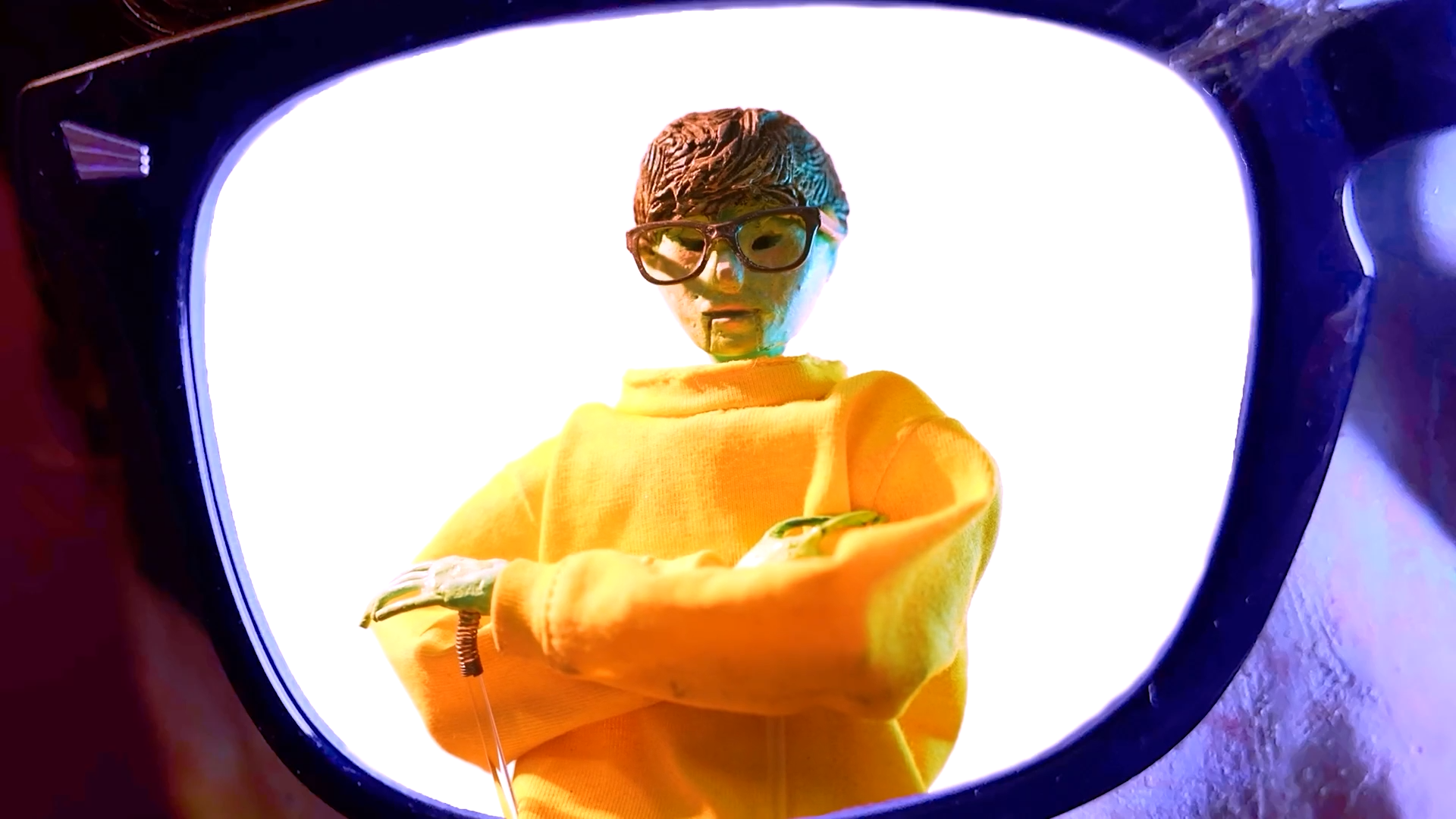
Hopeless NEET Inoue Masaki is transported to a planet of his discarded clones, where he is taken on a surreal quest to help create the perfect “Masaki.”
Inoue Masaki is a NEET (Not in Education, Employment, or Training) who recently quit his job and now spends most of his time in his room eating snacks and playing games on his phone. One day, he is suddenly thrown into his closet by a mysterious figure and transported to another dimension. There, Masaki meets Masaki No. 1, an identical version of himself dressed in a middle school uniform, who explains that he is on Planet Inoue—a planet inhabited by Masaki clones that were mass-produced under the direction of an alien who stole part of his consciousness, known as Papa. Identified as Masaki No. 88, Masaki learns that Papa seeks to create an Inoue Masaki worthy of life on Earth, sending the failures to live out their days on Planet Inoue. Guided by Masaki No. 1 and a crew of extraterrestrial Masaki-makers, Masaki undergoes a bizarre journey of self-discovery that forces him to consider the true value of his life.
■Drawing from his lifelong passion for sketching and clay modeling, SUZUKI Daichi’s delightfully imaginative sci-fi film explores real-world anxieties about socially constructed self-worth through an otherworldly allegory involving aliens, clones, and interdimensional travel, vividly brought to life with a rich array of handmade puppets and miniatures.
Wandering Memoria 18min.
Directed by Kaneuchi Takeki
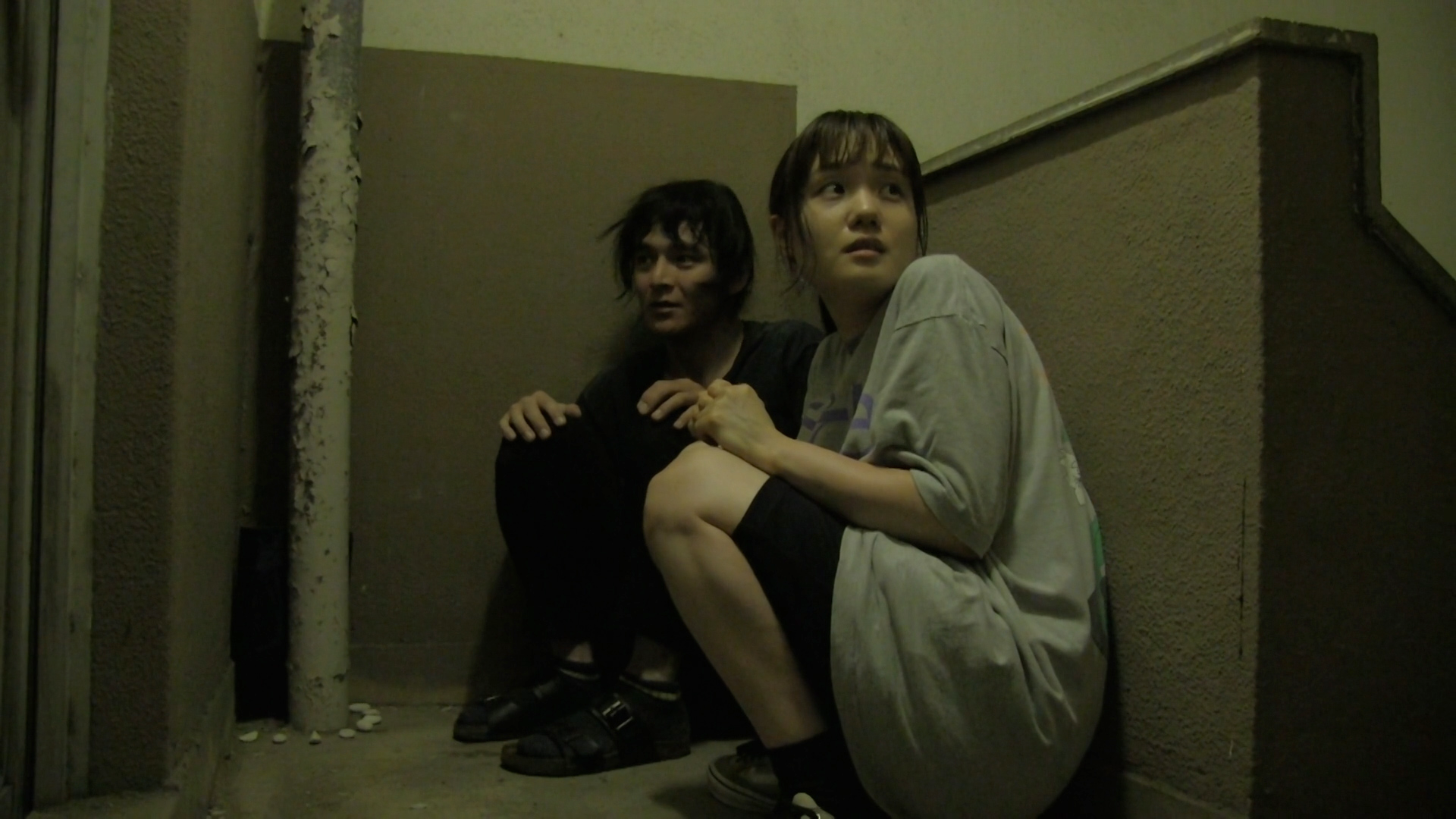
Before its scheduled demolition, a young woman and her boyfriend visit the nearly abandoned apartment complex where she grew up and once saw a ghost.
While biking home one day, Haruka discovers that the old apartment complex where she lived as a child is scheduled for demolition. That evening, she informs her boyfriend Natsuki, and the pair decide to take a spontaneous nighttime adventure to explore the nearly deserted building before its destruction. While there, Haruka recalls a childhood memory of seeing a ghost in the stairwell near the entrance to the building’s rooftop, a secret hangout spot for her and her elementary school friends. To appease the apparition and ward off a feared curse that would follow them into adulthood, the children offered prayers and sake with a makeshift stone altar. Now, as Haruka and Natsuki climb the stairs to the entrance of the roof, they find that the altar is still there, and something may still be haunting the building…
■Directed by KANEUCHI Takeki—horror film composer and founder of the theater company Seikabi—this short was created with just a two-person production crew consisting of the director and KURARI Haru, who shared duties in planning, cinematography, and acting. With its minimal, lo-fi aesthetic, the film draws out the unsettling creepiness hidden within the spaces of everyday life.
Dates:6~20 September 2025
Venue: National Film Archive of Japan
■Films PFF AWARD Competition in 2025
text by K. F. Watanabe
Anokoro (あの頃) 11min.
Directed by Toda Tota

When a high school student struggles to recognize his own life’s dream, a new friend reassures him with a symbolic dorodango, mud ball.
After a chance encounter, Muraoka, a shy high school student, meets Oishi, a quirky yet self-assured classmate, and the pair quickly become friends. Largely keeping to himself, Oishi carries around a treasure from his childhood days in a plastic case: a dorodango—a ball made by patiently applying sand on compacted mud over time—something Muraoka also enjoyed making as a child. One day, Muraoka struggles after a career survey prompts him to write his life’s dream and he confides to Oishi that he is unsure what it is. As Oishi reflects on Muraoka’s situation, his dorodango becomes a powerful symbol of holding onto and cherishing one’s dreams in the face of a reality that often forces people to abandon them. “Everyone has dreams,” Oishi reassures Muraoka, “we’ve just forgotten them.”
■Born in 2007 and interested in filmmaking since elementary school, director TODA Tota aimed to make a film that would reassure high school students close to his own age who may face uncertainty about their future. Like a dorodango, his film is a labor of love that attests to the joy of creating something to share with others.
Under My Skin 20min.
Directed by Hosokawa Yoshiharu

Hopelessly in love with her uninterested high school classmate, a seventeen-year-old girl navigates the messy, isolating reality of her desire.
A troubled seventeen-year-old girl living alone with her father has an all-consuming infatuation with a high school classmate who does not reciprocate her feelings. Following him around after school, her obsession leads her to seek out any form of connection, tangible or otherwise: a can of coffee touched by his lips, the lingering warmth on the bench where he sat, his discarded clothes. Undeterred by the boy’s indifference and even his violent rejection of her when they’re together, the solitary life she leads when they’re apart—isolated from her classmates and her father—reveals the frightening depths of her overwhelming distress, emotional instability, and torturous longing. In a society where sexual desire is treated as a transactional commodity, is there any place for her vision of love?
■Directed by HOSOKAWA Yoshiharu, this impressive debut narrative short about adolescent love and its raw, intense, emotional messiness was written from an original idea by lead actor SUZUKI Miyuki, who delivers an exceptionally commanding performance as a young woman on the verge of a nervous breakdown.
Kakuremino (カクレミノ) 35min.
Directed by Sawada Haru

Bullied at school, a transfer student forms an unexpected friendship with a mute girl in a hyottoko mask, prompting him to reconsider how to deal with his isolation.
Soon after transferring to a new high school, a bookish sixteen-year-old student named Tsukasa becomes the victim of relentless bullying by his classmates, pushing him to the edge of despair. One day, a strange, mute girl wearing the school’s uniform and a hyottoko mask (a comical depiction of an old man with a puckered mouth commonly worn during Japanese festivals) appears before him, communicating by notepad and pen. Believing her to be a hallucination or an imaginary friend conjured by his loneliness, Tsukasa refuses her repeated invitations to talk and walk home together. Before long, however, he realizes that the masked girl is indeed real—a student named Fumi who was also bullied but is now completely ignored by her classmates after a traumatic event. Finding solace in their status as social outcasts, the pair become increasingly close, leading Fumi to suggest Tsukasa become a living ghost like her.
■Finding inspiration in the concept of using “counterpoint” in filmmaking, director SAWADA Haru makes repeated use of contrapuntal music as ironic commentary on the sad—and sometimes very dark—situations and themes in her film. The choral song「怪獣のバラード」(“Kaiju Ballad”) leaves an especially strong impression.
Naomi Out of Sync (空回りする直美) 44min.
Directed by Nakazato Fuku

An eighteen-year-old girl looks after her developmentally disabled brother with love and humor. When she accidentally hurts his feelings, however, their world is turned upside down.
Living in a cramped Tokyo danchi apartment with her largely absent father and her older brother Shingo, who has a developmental disability and physical tics, eighteen-year-old Naomi has a lot on her plate. Not only must she mediate conflicts between her father and brother at home while holding down a part-time supermarket job alongside an adversarial co-worker, but she also takes on the role of Shingo’s caretaker—reminding him to eat, bathe, and take his medication—when their father leaves them alone for days on end. Despite her naturally humorous and playful disposition, Naomi’s protectiveness toward her brother makes her lash out at a rude stranger during a park outing, unintentionally hurting Shingo’s feelings. The resulting rift between siblings plunges Naomi’s world into turmoil when she later comes home to find that Shingo has gone missing.
■This endearing comedic drama, directed by NAKAZATO Fuku, excels at capturing the special bond between close siblings whose love for each other helps them overcome life’s hardships. Although the brother and sister characters inhabit a very small space, their intimate relationship and unique personalities make their shared world feel larger than the universe.
Yellow Stain (黄色いシミ)32min.
Directed by Nomura Kazuaki

A driver picks up three young men to commit an unspecified crime. When one of the men becomes unresponsive, the situation quickly turns life-or-death.
In this tense, minimalist thriller, a young driver is tasked with picking up three other young men to carry out an unspecified crime in broad daylight. Following precise instructions through an earpiece from an anonymous handler surveilling his every move, he carries out his duties with stoic composure under mounting pressure. But when the job is nearly complete, the final drop-off takes an unexpected turn: the last remaining passenger suddenly becomes unresponsive—frozen in fear or regret—jeopardizing the mission. Reporting back, the driver receives a final, chilling command that leaves him face to face with a yellow stain. Loosely inspired by true events, Yellow Stain examines the dilemma of young men forced into crime with their lives on the line.
■Directed by NOMURA Kazuaki—who appeared as an actor in the 2022 PFF Grand Prix-winning film "J005311" directed by his collaborator KONO Hiroshi, who also makes an appearance in this film—this meticulously planned short is shot largely in close-up in a single take, making full use of real-time silence to amplify the unnerving tension of the story to maximum effect.
Wounded Angels (傷ついた天使) 96min.
Directed by Tanabe Kosei

Leaving behind everything, a young man journeys from his home in Tokyo to the open road without looking back. But what is he truly searching for?
One day, a listless twenty-something movie rental store employee named Jun decides to leave his Tokyo apartment and hit the road on foot, intending to never return. Almost immediately, his possessions are stolen, but he continues on with only the clothes on his back and the little cash left in his pocket, unbothered. Jun’s journey takes him through the city, where he meets a young salaryman interested in music and film but too busy to enjoy his hobbies, and into the woods, led by a disinterested young man living with his perpetually drunk brother, until he eventually ends up in a small seaside town with views of Mount Fuji. There, he is taken in by a group of similarly aimless but carefree peers who spend their days driving around, smoking, and playing on the beach. Each encounter subtly transforms the quietly observant Jun, yet the conclusion of his soul-searching odyssey—and the reasons behind it—remains just out of view.
■Director TANABE Kosei (selected for the 2024 PFF Award for his first feature film "Goodbye Icarus") returns to the festival with an introspective road film that captures the existential malaise of youth searching for meaning. With a mixture of empathy, humor, and curiosity, he sets his character upon a quest for utopia within a free-flowing narrative that offers more questions than answers.
Caravan 59min.
Directed by Shoji Ko

Four college friends spend one final summer together before adulthood pulls them apart, hoping to create lasting memories—even as one quietly struggles to retain his own.
In their final summer together after graduating from university, four close friends take one last trip before they each embark on their own post-collegiate path. Renting a small cabin in the remote countryside, they pass the days idly taking in nature, sitting by the fire, reminiscing, and shooting the breeze. Every now and then, someone mentions their plans after the summer—one of the friends will return to Denmark, another will become a salaryman. The only one undecided is Wakamatsu, who appears somewhat withdrawn throughout their vacation. Left alone with one of the friends, he confides that he has trouble remembering things due to a childhood head injury—memories of events and people he’s met seem to fade gradually until he can’t recall them at all. Will he remember this trip, meant to preserve their final moments together? Will he even remember his friends?
■Taking inspiration from Jonas Mekas’s 1968 experimental diary film Walden, director SHOJI Ko’s laid-back drama considers the nature of memory and how it shapes our experience of life. With this simple yet profound premise, he creates a bittersweet summer travelogue—replete with non-narrative interludes and languorous shots of trivial conversation—that urges viewers to reflect on the memories that constitute a life lived.
Kussetsu no Yukue (屈折の行方) 66min.
Directed by Kamobayashi Tomonari

A film student turns his camera on his former teacher—once the target of his bullying—unearthing the long-buried guilt and resentment between them.
Struggling with the script for his thesis film about classroom bullying, university student Kenichi decides to instead make a documentary about Kaneko-sensei—his former elementary school teacher who resigned after being bullied by his students, Kenichi foremost among them. Now living alone as an unmarried day laborer in his parents’ home, Kaneko agrees to Kenichi’s proposal but chooses to fabricate aspects of his solitary life to seem less pitiful: he claims to make a living as a photographer and enlists his ex-wife to pretend they are still married and living together. As Kenichi begins filming Kaneko at home, a cat-and-mouse game develops between the filmmaker and his subject, gradually exposing the true feelings hidden within both perpetrator and victim—a volatile mix of guilt, resentment, and self-preservation simmering beneath the formalities of their daily interactions. As the project unfolds, Kenichi’s camera becomes a mirror, reflecting
■This precise and subtly profound drama about atonement by KAMOBAYASHI Tomonari explores the gap between truth and reality in filmmaking—and in life—by using the framework of documentary to underscore the complex interplay of agency and intention between filmmaker and subject. With careful pacing and layered dialogue, KAMOBAYASHI’s film invites us to carefully consider both sides of the camera lens.
Kurenai no Sora (紅の空) 26min.
Directed by Segawa Sho

In a dystopian alternate reality, Japan’s skies burn red from environmental pollution, clouding a high school boy’s vision of the future.
In this speculative science fiction short set in an alternate reality, Japan has become one of the world’s great chemical industrial superpowers since 1938 due to its invention and production of synthetic petroleum. Nearly a century of environmental pollution has turned Japan’s skies a crimson red, and extremist groups have responded with terrorist attacks on the chemical plants responsible. Against this dystopian backdrop, a melancholic high school student named Ito transfers from Sapporo to Tokyo where he meets Nono, a classmate who also ditches classes to hide away in the school library. When Ito receives news that his father may be among the men missing in the latest chemical plant bombing, the direction of his life becomes even more uncertain—he doesn’t belong in Tokyo, but he also doesn’t want to return to Sapporo, and his childhood dream of becoming a pilot seems impossible. Meanwhile, Nono plans her own escape.
■In this thought-provoking short, director SEGAWA Sho captures the despondency and aimlessness of young people thrust into a violent, destabilized world beyond their control and comprehension. Set in a fictional Japan that mirrors its present-day reality, the film’s pervasive red sky provides a striking visual warning of what may come—or what is already here.
CROSS-TALK 26min.
Directed by Harada Joe

A call center employee, desensitized by the endless complaints of others, learns the importance of human connection after responding poorly to a colleague’s cry for help.
Tokita works part-time at a TV station in Shibuya where he fields phone calls from viewers who mostly lodge complaints. Numbed by the repetitive nature of his job, he issues canned apologies without fully addressing the callers’ concerns. His antisocial behavior extends beyond the office: instead of joining his chatty co-workers for after-work drinks, Tokita would rather retreat to his apartment and watch silent movies alone. One night, Funai, a junior colleague who has taken an interest in him, calls Tokita in a moment of panic after being grabbed by a stranger on the way home. But Tokita, unable to recognize her distress and need for reassurance, gives Funai an inappropriately dismissive response and she hangs up on him. The next day, she doesn’t respond to his text messages and avoids him at work, prompting Tokita to regret his words and reflect on his inability to connect with those around him.
■Setting his film in the bustle of Shibuya, director HARADA Joe succinctly examines the ironic isolation of modern Tokyo life through the simple yet effective premise of a man who spends his days talking to strangers yet fails to communicate with the people closest to him—even those who most need his support.
Vicissitude(郷) 93min.
Directed by Ijichi Takuro

When personal tragedy strikes, a high school baseball player reflects on his childhood in Kagoshima as he ponders the meaning of his life.
Soft-spoken high school freshman Gaku has a single-minded ambition to become a professional baseball player. Ignoring the guidance of his teachers and abandoning his social life—including the gentle romantic advances of his classmate Saki—he obsessively commits himself to his stern head coach’s rigorous, military-like training regimen while enduring insults and bullying from upperclassmen on the team. As Gaku’s perseverance and hard work begin to pay off, however, a life-changing event forces him to reconsider his future and reflect on his past. Meeting with his school’s guidance counselor, Gaku recalls his childhood days spent playing in the mountains, forests, and surrounding sea of his hometown in Kagoshima with his best friend Ryu, triggering a shift in the film toward poetic abstraction as Gaku’s past, present, and future collide to reveal his innermost thoughts.
■In this highly accomplished debut feature, director IJICHI Takuro—born and raised in Kagoshima—takes bold artistic swings to convey the scope of his philosophical vision, filling his unconventional youth drama with stunning shots of his seaside hometown as an expression of his protagonist’s spiritual yearning. A gorgeously shot, narratively experimental meditation on youth and the loss of innocence.
Jinsei wa Itsudatte Hard da(人生はいつだってHARDだ) 34min.
Directed by Kasahara Takashi

Living together in a rundown Tokyo apartment, two men aimlessly trudge through their lackluster routines until a hiking trip ruptures their co-dependent complacency.
Thirty-year-old unemployed slacker Takashi lives in a cramped Tokyo apartment with forty-year-old Akio, who sells amaguri (broiled sweet chestnuts) from a tiny stall at Shibuya Scramble Crossing. With considerable patience and kindness, Akio watches over the immature and brash Takashi, sharing every aspect of domestic life—eating, sleeping, showering, and even urinating together—without much conflict. Depressed from a recent breakup, Takashi spends most of his day sleeping and masturbating. Meanwhile, Akio drifts through his monotonous work routine with little thought, appearing neither happy nor sad. However, when the pair take a spontaneous hiking trip, Akio takes an unexpected action that startles Takashi. Afterwards, a subtle shift emerges between the two friends, signaling the possible end of their relationship—or, for Takashi, perhaps a new beginning.
■Rooted in frustrations with his own life, director KASAHARA Takashi created this DIY film with HATTORI Akio as a two-man crew, sharing acting, writing, directing, cinematography, editing, lighting, art direction, and sound roles. A raw, honest self-portrait that channels the stagnation, fatigue, and harsh realities of everyday life.
Yet To be Named (名前をつけるのは、これから) 39min.
Directed by Ebayashi Mizuki

Confronted with a major life change, a young filmmaker turns to his unfinished script in order to process his insecurities and past trauma.
Twenty-eight-year-old filmmaker Yukihiko moonlights as a food delivery worker in Tokyo while living with his partner Kaede, who is pregnant with their unnamed first child. Introspective and restless, he spends his day working on the untitled draft of his screenplay, an autobiographical story about a twenty-eight-year-old food delivery worker named Yukihiko who meets his father almost twenty years after being abandoned by him. As Yukihiko pores over his writing and repeatedly recites the dialogue between his father and son characters, the layers of his own life trauma are gradually pulled back to reveal his lingering pain from being left behind and his insecurity about becoming a father. Searching for answers to the questions that still haunt him, Yukihiko repeatedly asks himself aloud, “Why?”
■In this reflexive medium-length drama, director EBAYASHI Mizuki takes a boldly minimalist approach—primarily setting the film in a single room as day turns to night—and emphasizes repetition to trance-like effect, provocatively capturing the artist’s struggle to understand himself through his own work.
Noise no Junin (ノイズの住人) 48min.
Directed by Andrés Madrueño

Three young filmmakers chase their dreams while sharing a single-room apartment, facing constant setbacks and the harsh realities of no-budget filmmaking.
Togo, Asuka, and Toru are three young aspiring filmmakers dedicated to chasing their artistic ambitions despite limited resources. While Togo and Asuka quit their part-time jobs, the more practical Toru is accepted into graduate school and plans to find work after graduation. The trio move into a single-room apartment together on the outskirts of Tokyo, where they plan to live while making their next film. Yet despite their determination to resist the conventional life forced upon them by society—defined by meaningless work, overtime, bosses, and power harassment—they cannot escape the need to constantly discuss expenses and pool together whatever yen remains in their pockets to keep their dreams alive. ¥60,000 for rent, ¥62,000 for their next film, ¥200,000 for a screening space… As the friends earnestly press forward, constant setbacks and disappointments force them to wonder how long they can sustain this way of life.
■Motivated to inspire fellow aspiring filmmakers, Mexican-born director Andrés MADRUENO embraces the constraints of a low budget as an opportunity for experimentation and discovery, creating an idiosyncratic work that both celebrates and empathizes with the realities of a creative life. Like his characters, MADRUENO rejects convention and ventures boldly into uncharted territory in pursuit of individual expression despite all.
PEAK END 120min.
Directed by Shin Chaerin

Two young artists in Kyoto turn their cameras on each other to create a dual portrait that meditates on art, friendship, and self-discovery.
Rin and Sora are young artists and university film students living together in Kyoto as outsiders—Rin from Seoul and Sora from Okinawa. Despite their divergent backgrounds, and the fact that they’ve only known each other a short time, the women quickly become two halves of the same whole. They begin filming their relationship, taking turns recording each other as they share their thoughts and document their artistic collaborations—sending jam sandwiches to the sky with yellow balloons, hanging diaristic photographs in a makeshift tunnel exhibition. From there, the pair travel to Okinawa, transforming the film into a home video-like travelogue that explores the people and places that shaped Sora’s identity. As they shift fluidly between observer and observed, Rin and Sora examine how their identities both diverge and intersect, blurring the line between subjectivity and objectivity and deepening a bond that transcends what can be captured on film.
This freewheeling hybrid documentary, directed by SHIN Chaerin (“Rin”), celebrates her personal relationship with Sora, who appears in the film as its primary subject alongside the filmmaker. Like Rin and Sora, the film is constantly in motion, searching for itself—improvising as it moves through uncertainty, guided by the friendship at its center that gives it meaning.
BRAND NEW LOVE 84min.
Directed by Iwakura Ryuichi

A young couple on the verge of breaking up take a short trip to watch over a relative’s antique shop, putting their love to the test.
Yuiko and Kenichi are a young couple hitting a rut in their relationship. When Yuiko’s divorced uncle must leave town for a few days to attend a wedding, she agrees to watch over his small antiques shop in western Tokyo—derailing Kenichi’s plan to go on a proper birthday trip together and widening the distance between them. Staying in the old apartment above the shop, the pair sleep in separate rooms, exchanging only the bare minimum through a sliding door. But when Kenichi takes an interest in a set of teacups on display, Yuiko secretly sets out to secure them as a birthday gift—only to discover that the cups have already been sold to its previous owner, who reveals their symbolic meaning. As Yuiko and Kenichi each spend time alone, they privately long to repair their fractured relationship—but can their old love find a new beginning?
■Taking inspiration from Roberto Rossellini’s 1954 film A Trip To Italy, director IWAKURA Ryuichi’s artfully crafted debut feature offers a nuanced, realistic portrait of a relationship on the verge of collapse. Through quiet gestures and nuanced behaviors that reveal his characters’ inner lives, IWAKURA demonstrates the power of subtlety and restraint in conveying profound emotions.
Boku wa Gataro (僕はガタロウ) 18min.
Directed by Kubochi Hono

A bookish high schooler hides his fear of insects to befriend a bug-obsessed transfer student, leading to a series of comical and heartfelt misunderstandings.
Book lover Kotaro collides with transfer student Yukiko in their high school hallway while they are both absorbed in their books. Thinking he’s found a fellow bookworm, Kotaro later approaches Yukiko—only to discover, to his mild horror, that her true passion isn’t books, but insects… which terrify him. Mishearing his name as Okuwa Gatarou (a play on the word okuwagata, a Japanese giant stag beetle), Yukiko meanwhile believes she's found a fellow insect enthusiast. Keeping his phobia and real name a secret, Kotaro continues spending time with Yukiko, becoming increasingly drawn to her unabashed eccentricity and unbridled enthusiasm. When he finally reveals the truth during a rare beetle-hunting excursion, however, Yukiko feels betrayed, and their relationship is abruptly fractured. Desperate to win her back, Kotaro turns to his friends—and to Yukiko’s drawing of a large tiger longhorn beetle—for help.
■In this charming coming-of-age romance, full of warmth and clever wordplay, director KUBOCHI Hono celebrates the value of appreciating people for who they truly are—even if their passions are a little squirm-inducing. Adding a touch of humorous realism, KUBOCHI cast her film school colleague, who has a real-life aversion to insects, in the role of Kotaro.
My Small World 11min.
Directed by Maruoka Yuzuki

A shy elementary school girl who refuses to attend school joins a music class, where she discovers her voice—and a new friend.
Natsuki, a shy and solitary fifth-year elementary school student, skips school every day. Instead, she attends after-school music classes where she enjoys singing as part of a choir, led by a kind instructor who helps her find her voice. Her elementary school classmate, Ayaka, who also participates in the music classes, at first notices Natsuki and coldly remarks, “You don’t come to school, but you come here, huh?” As the days pass, however, Ayaka continues to be intrigued by Natsuki, who single-mindedly practices her singing and dancing alone in the park, seemingly content in her own little world. As Natsuki’s confidence grows, a subtle shift occurs between the girls’ interpersonal dynamic. One day, Ayaka follows Natsuki to the park to be near her, opening a path to reconciliation and friendship.
■This heartwarming short was inspired by director MARUOKA Yuzuki’s childhood memories of participating in a musical troupe, whose members also make an appearance in the film. Its simple yet moving premise uses song to deliver an emotional punch and remind audiences of the tender preciousness of youth.
Miyazawa-san wa Hagasenai(宮沢さんは剥がさせないっ!) 12min.
Directed by Kanazawa Makoto

With help from his friends, a high school boy hatches a plan to remove the mask from his longtime crush in order to finally reveal her smile.
High school student Shin falls madly in love with his classmate Miyazawa Sana at first sight. Two years pass before he finally gathers the courage to offer her a letter that expresses his feelings. Yet even after another two months, their relationship fails to progress, and Shin’s fixation reaches a breaking point. With his friends Ryutaro and Sadahiko, Shin hatches a three-pronged plan to remove what he sees as the final barrier between him and Sana: the mask she always wears. First, strongman Ryutaro will try to snatch the mask away by brute force. Second, tech nerd Sadahiko will attempt to subdue her with a remote controlled device and the school’s hacked security cameras. And, if all else fails, Shin must confront Sana himself. Evading capture by Ryutaro and Sadahiko, Sana is left alone with Shin, where her mask is finally removed—revealing her secret…
■Utilizing a comically hyperreal live-action anime style mixed with animated sequences, director KANAZAWA Makoto’s inventive short takes a lighthearted take on the timeless theme of teen love, buoyed by an energetic soundtrack. Beneath its playful surface, however, lies an earnest message of love and acceptance.
Ro-16 Gotou (ロ-16号棟) 11min.
Directed by Inoue Yui

A boy and girl reconnect over their shared childhood around a danchi apartment complex while the sights and sounds of demolition surround them.
While drawing outside of a danchi apartment building undergoing demolition, Rui reunites with Ueki, a boy who once attended the same kindergarten as her. Though they haven’t seen each other since that time, Ueki has kept a drawing that Rui once drew of him, a precious connection to the past. They go on to spend the summer days together, circling the danchi and surrounding areas—riding bikes, eating snacks, and reminiscing. Rui gives Ueki a new drawing of his face, signifying the changes they’ve both gone through since they were kids. All the while, the loud clanging, buzzing, and thuds of demolition echo around them, making Rui wistful for days she spent living in a place that will soon cease to exist. Powerless against the inevitable change, Ueki can only suggest that perhaps the buildings will not disappear, but be reborn.
■Inspired by her own experience of witnessing demolition in an area dear to her, director INOUE Yui returned to capture the scenery for this personal short film. Assembled from impressionistic set pieces and playful visual interludes, Ro-16 Goto is imbued with a nostalgia for the simpler days of childhood.
Wakusei Inoue (惑星イノウエ) 54min.
Directed by Suzuki Daichi

Hopeless NEET Inoue Masaki is transported to a planet of his discarded clones, where he is taken on a surreal quest to help create the perfect “Masaki.”
Inoue Masaki is a NEET (Not in Education, Employment, or Training) who recently quit his job and now spends most of his time in his room eating snacks and playing games on his phone. One day, he is suddenly thrown into his closet by a mysterious figure and transported to another dimension. There, Masaki meets Masaki No. 1, an identical version of himself dressed in a middle school uniform, who explains that he is on Planet Inoue—a planet inhabited by Masaki clones that were mass-produced under the direction of an alien who stole part of his consciousness, known as Papa. Identified as Masaki No. 88, Masaki learns that Papa seeks to create an Inoue Masaki worthy of life on Earth, sending the failures to live out their days on Planet Inoue. Guided by Masaki No. 1 and a crew of extraterrestrial Masaki-makers, Masaki undergoes a bizarre journey of self-discovery that forces him to consider the true value of his life.
■Drawing from his lifelong passion for sketching and clay modeling, SUZUKI Daichi’s delightfully imaginative sci-fi film explores real-world anxieties about socially constructed self-worth through an otherworldly allegory involving aliens, clones, and interdimensional travel, vividly brought to life with a rich array of handmade puppets and miniatures.
Wandering Memoria 18min.
Directed by Kaneuchi Takeki

Before its scheduled demolition, a young woman and her boyfriend visit the nearly abandoned apartment complex where she grew up and once saw a ghost.
While biking home one day, Haruka discovers that the old apartment complex where she lived as a child is scheduled for demolition. That evening, she informs her boyfriend Natsuki, and the pair decide to take a spontaneous nighttime adventure to explore the nearly deserted building before its destruction. While there, Haruka recalls a childhood memory of seeing a ghost in the stairwell near the entrance to the building’s rooftop, a secret hangout spot for her and her elementary school friends. To appease the apparition and ward off a feared curse that would follow them into adulthood, the children offered prayers and sake with a makeshift stone altar. Now, as Haruka and Natsuki climb the stairs to the entrance of the roof, they find that the altar is still there, and something may still be haunting the building…
■Directed by KANEUCHI Takeki—horror film composer and founder of the theater company Seikabi—this short was created with just a two-person production crew consisting of the director and KURARI Haru, who shared duties in planning, cinematography, and acting. With its minimal, lo-fi aesthetic, the film draws out the unsettling creepiness hidden within the spaces of everyday life.
